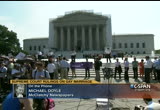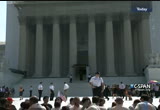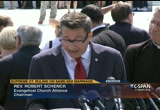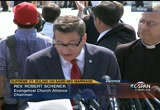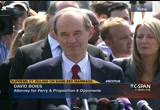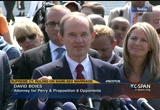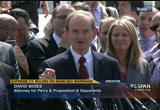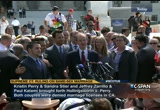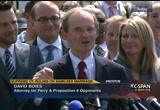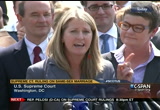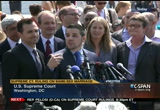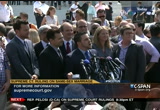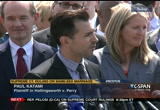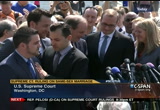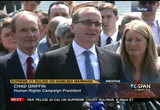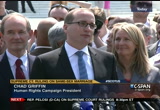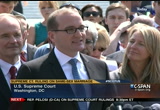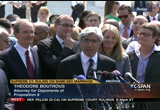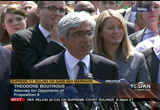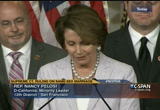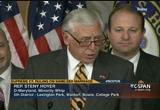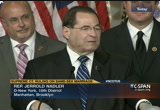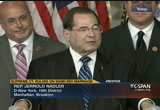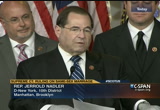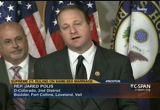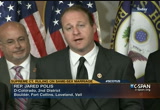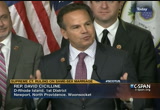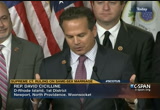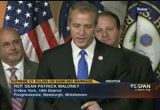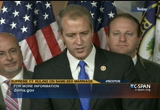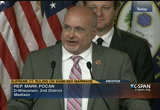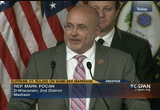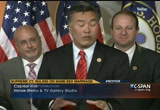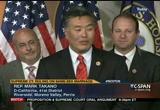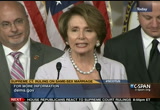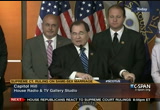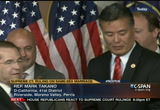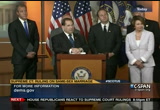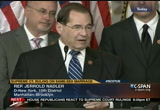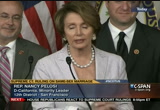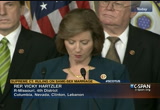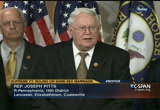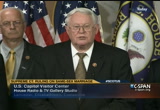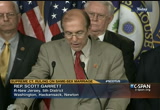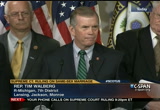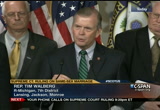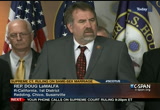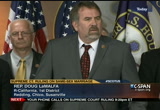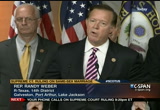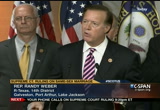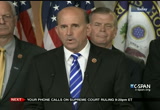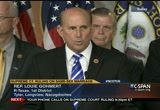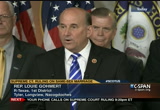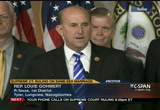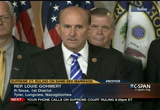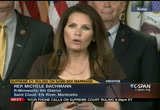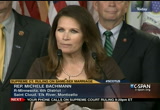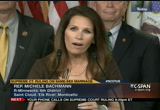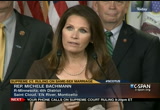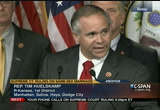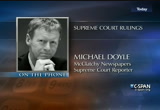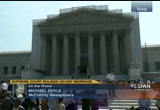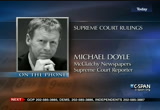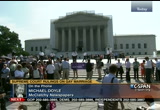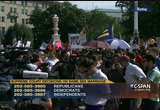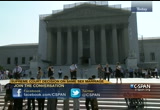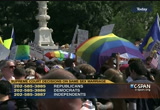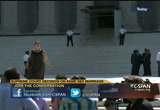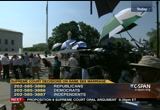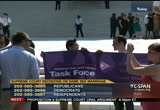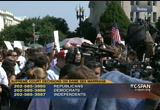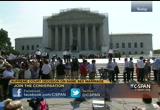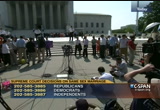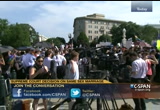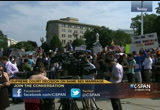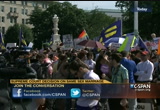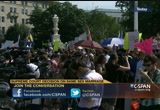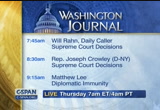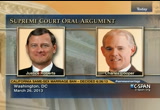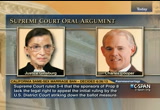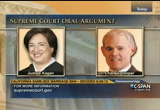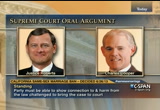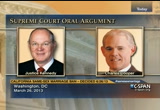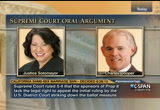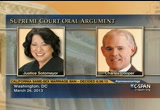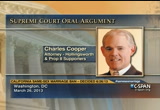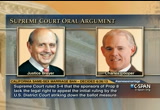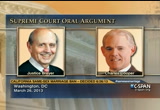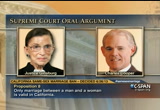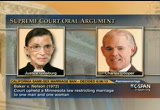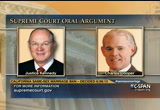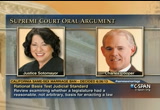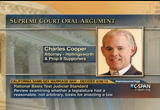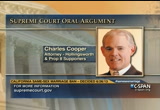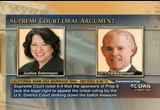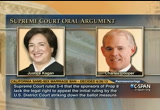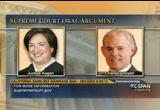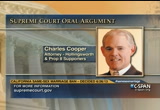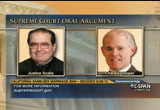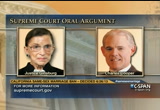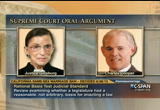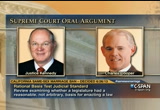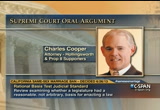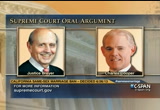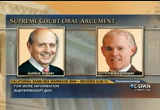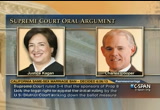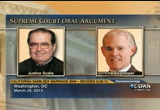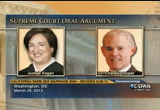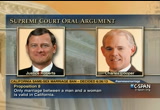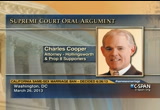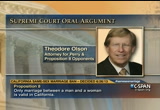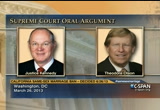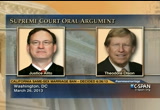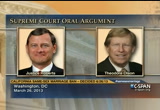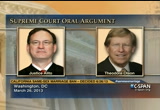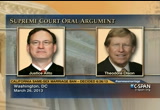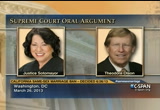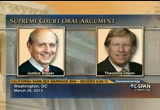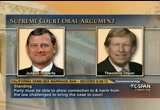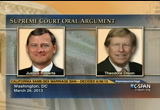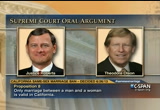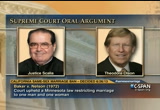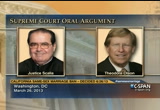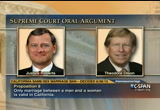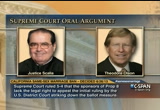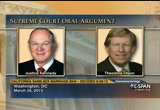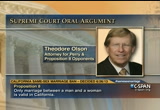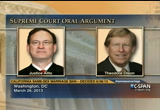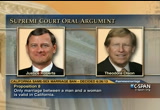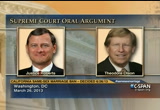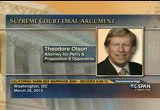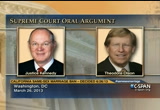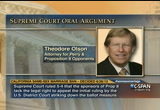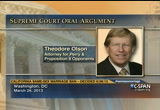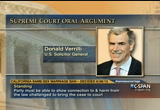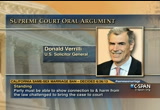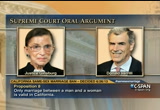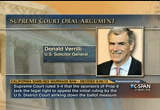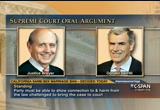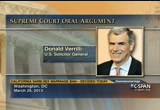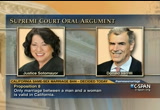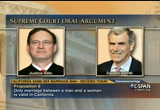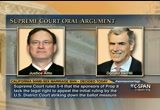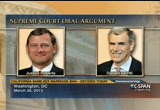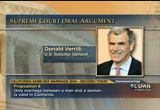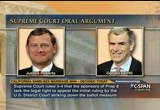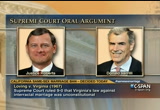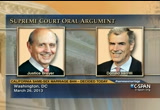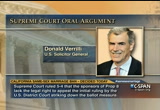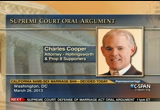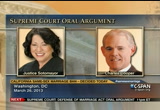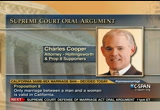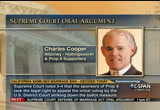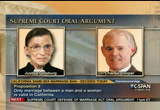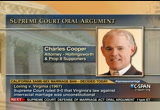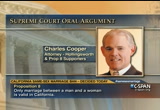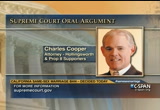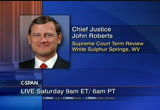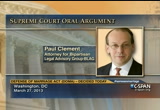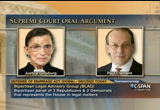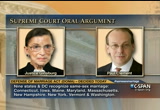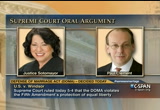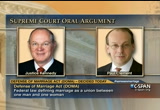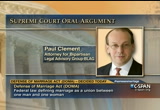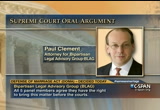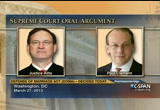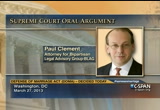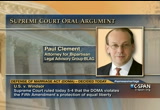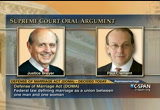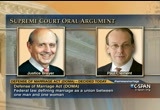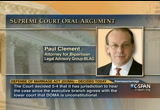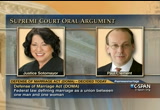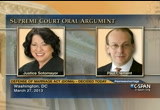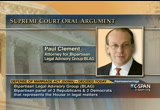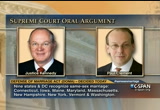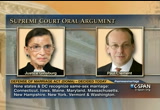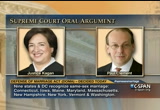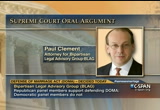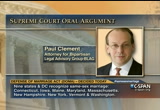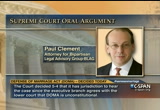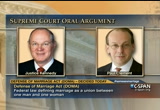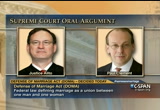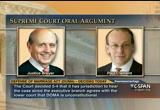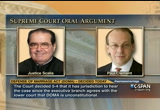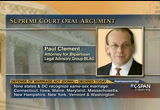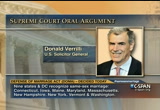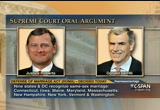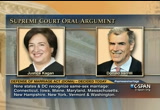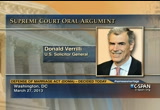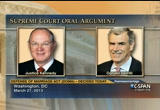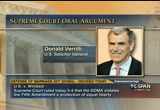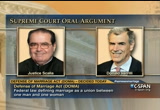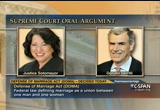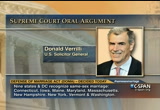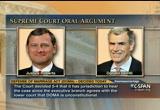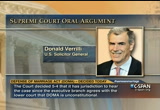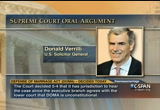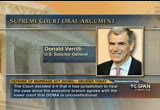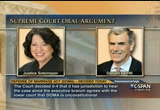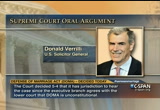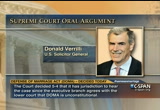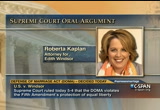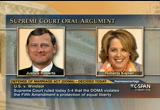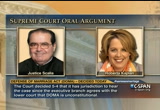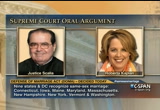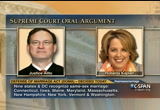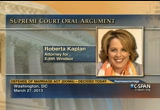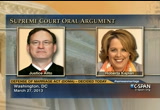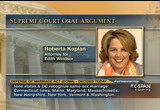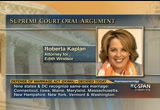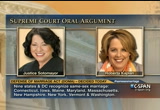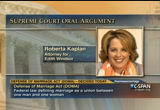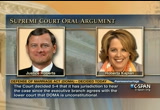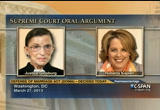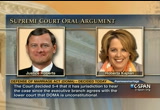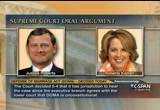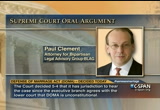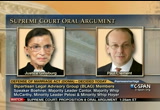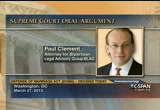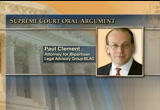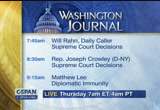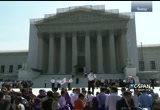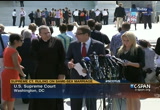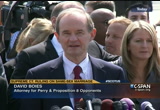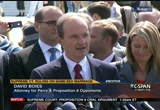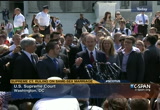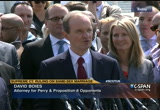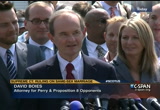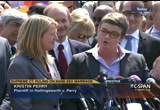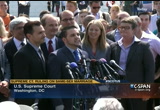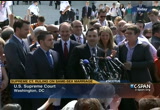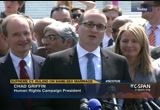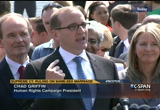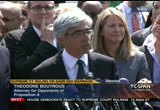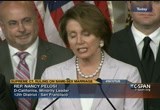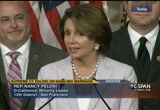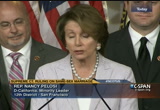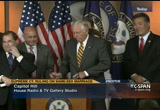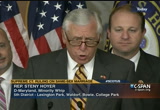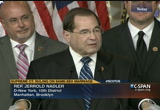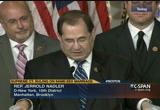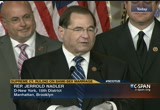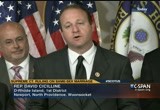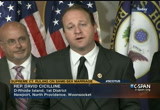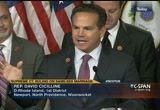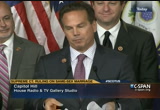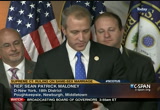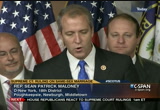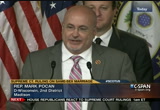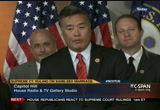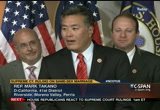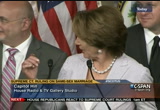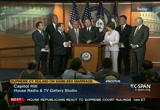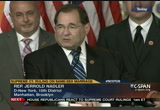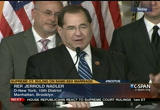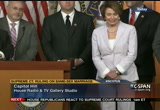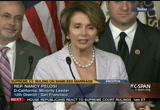tv Capitol Hill Hearings CSPAN June 26, 2013 8:00pm-1:01am EDT
8:00 pm
predictable. >> michael doyle covers the supreme court for mcclatchy newspapers across the country. thanks for >> coming up on c-span, reaction. democrats and republicans react to the rulings on capitol hill. later, we take your calls and comments on what you think about the court's decision. the supreme court wednesday struck down the federal provision denying benefits doj couples. the defense of marriage act 5-4.s -- the vote was the supreme court cleared the way for same-sex marriages in california. here is reaction from supporters and opponents in front of the supreme court.
8:01 pm
schenck.everend rob i have just come from the courtroom. the opinions have been filed in both cases. i will make statements on behalf of the evangelical church of alliance which represents thousands of evangelical clergy as well as 350 military chaplains. theou have already heard, court has struck down the defense of marriage act. it is unconstitutional. no standing ond
8:02 pm
the hearts of the advocates of proposition 8 in california. i will be addressing both of those outcomes on behalf of the evangelical church alliance. if churches like as well as traditional christians who advocate for marriage as between a man and a woman. no matter how any of us feel about the outcomes in these cases, one thing is true. the supreme court has no authority when it comes to the nature of marriage. that authority belongs to the creator, whom our founders declared as the source of all of our rights. the public conversation over marriage continues and that is a good thing.
8:03 pm
when it comes to the defense of marriage act, there are a myriad of respective's among evangelicals and other christians of traditional faith, but some believe it is rest to get the federal government out of as many areas as possible, including marriage. so there are those of us who are disappointed on the court's action on dilma, while others say, yeah eight. doma, while others say, beenanother tooth has extracted from the federal monster. on proposition 8, the question of whether the people will get to decide for themselves how marriage will be practice in their states appears to await another day.
8:04 pm
and that is a good question to pursue. there disappointed in short-term results. short-term questions that remain unsettled, but the public conversation continues and that is a good thing. today'sg a true about court decision on marriage -- they do not change the biblical or timeless truth of the nature of marriage as between a man and a woman. importantly, for christians of traditional faith, like evangelicals for whom i speak, today's decisions are an invitation to look at the reality of same-sex couples and amilies differently.
8:05 pm
through the lens of god's love, to seek and administer with grace and mercy to all people. to all,el is open regardless of their sexual orientation or the configuration of their families. this is a challenge that our folks need to meet. with prayer and god's wisdom, i know we will meet it. i will be making extended remarks and leading a brief prayer service on the podium just over to my right, following the other comments of these microphones. >> catholics united for life, i concur with my brothers statements. >> reverend rob schenck, chairman, evangelical church of alliance.
8:06 pm
>> my name is jennifer kearns. i was the official spoke person for opposition 8 in california area i am here today on behalf of the 7 million voters in the state of california who voted for proposition 8. the state ofause california has a system of direct democracy. more than 7 million voters voted for proposition 8 and more than 10 million voters in the mid-1990's voted for proposition 22. while i have been quiet for the last five years, for this proposition to take its course, i am here today on behalf of the 7 million voters in the state of california to express our disappointment. we believe that every vote should count. thank you.
8:07 pm
[applause] >> again, my name is jennifer kerns. i was the spokes person for opposition 8. i will be over here you need any comments. qwest congressman from the state of kansas, get you some comments. in the decision today, the supreme court has offered to to be a very contradictory rulings. on one hand, they claim to say that the states have a right to decide the definition of marriage. in the second decision, they said that the state and the voters do not have the right to decide. the descent on the first decision was very clear. if this court taken upon itself a radical attempt to redefine marriage. what gets lost in this attempt is the needs of our children.
8:08 pm
8:10 pm
>> good morning. i am adam, the executive director of the federation for equal rights. it is my privilege to be here this morning with a board members of the american foundation for equal rights. >> this is a great day for america. , the united today states supreme court in lawrence against texas took the first important step to guaranteeing
8:11 pm
that all americans among regardless of sexual orientation, are equal citizens under the law. today, the united states supreme court, in two important decisions, brings us that much closer to true equality. asthe decision striking unconstitutional, the so-called defense of marriage act case, the united states supreme court held that there was no precedence for depriving gay and lesbian couples of the right to marry the person they love. there was no legitimate justification for that. thatstice scalia noted, holding, that principle, guarantees the right of every individual in every state to marriage equality. , thee california case
8:12 pm
supreme court held that the proponents of proposition 8 did not have standing. what that means is that in that case, the supreme court could the merits. everything that the supreme court said in the defense of marriage opinion where they didn't reach the merit demonstrates that when that case finally does come to the united states supreme court on the merit, marriage equality will be a law throughout this land. our plaintiffs now get to go and togetherornia with every other citizen of california, marry the person they love. [applause] and the next step is to translate the promise that was in lawrence and was reaffirmed case thathe doma
8:13 pm
every citizen in every state has the right to marry the person that they love. the supreme court's decision on standing is another important -- is important for another reason. when we started out in this case, we said we were going to prove three things. we were going to prove that marriage is a fundamental right and to the other side accepted that. goingd, second, we were to prove that depriving gay and lesbian citizens of the right to marry the person they love seriously harms them and serves to harm the children they are raising. agreedn the opponents with that. and third, we said that we were going to prove that allowing everyone to marry the person that they love, regardless of sexual orientation, did not and
8:14 pm
could not harm anyone. and not only did the proponents on cross examination have to accept that, but today the united states supreme court said as much because they said the no concreteave injury. they cannot point to anything that harms them because these two loving couples and couples like them throughout california are now going to be able to get married. and so, this is a wonderful day for our plaintiffs. it is a wonderful day for everyone around this country and in california in particular who wants to be able to marry the person that they love to read but it is a wonderful day for america because we have now taken this country another important step towards guaranteeing the promise that is in our constitution and our
8:15 pm
declaration of independence that all people are created equal. that all people have the inalienable right to life, liberty, and the pursuit of happiness. this is a great day. we thank the supreme court. we thank all of you and perhaps most important, we thank all of the people who devoted so much to this battle over so many decades. people who did it at a time when foras not as easy as it was dave olsen and myself to go into court. the only thing that i regret today is that my friend and colleagues cannot be here. he has been a leader in this battle for the last four years. he is unfortunately, today, in another court in another part of the country, arguing another case. but his spirit is here and he will be with me tonight. we will celebrate because this is a victory not just for us, not just for the plaintiff, not even just for the people who worked for this for many decades come a but for all americans.
8:16 pm
thank you. >> we will now have comments from the plaintiffs in the case. >> today is a great day for american children. sandy and i want to say how happy we are, not only to be able to return to california and finally getting married, but to be able to say that the children in california, no matter where you live or who your parents are, no matter what family you are in, you are equal. you are as good as your friend's parents and as your friends. we believe from the very beginning that the importance of this case was to send a message to the children of this country that you are just as good as everybody else, no matter who you love or no matter who your parents love. today we can go back to california and say to our own children, all four of our boys,
8:17 pm
your family is just as good as everybody else's family. we love you as much as anybody else's parents love their kids. we are going to be equal. now we will be married and we will be equal to every other family in california. thank you. [applause] >> today we also want to say thank you to all of you. q why to all of our supporters, our amazing lawyers. thank you to the constitution and thank you to justice that was served today. we think the justices for overturning doma. this is so important for us and all families. we thank the justices for letting us get married in california, but that is not enough. it has to go nationwide. we cannot wait for that day. it is not just about us. it is markets in the south, kids kids in texas. kids everywhere. we want to get equality for everyone in this entire country. thank you, all. it has been a pleasure and an
8:18 pm
honor to represent you. >> we will now hear from all of the plaintiffs in the case. >> i do not need these. anddesire to do something get involved in this case, tob plaintiffs, was very important to us. harry changed the conversation. it altered the game and created a ground swell of momentum and passion that brought us here to the supreme court today. today, the court said that i am more equal, that we are more equal, our love is just like our parents and our grandparents, and any children we may have in the future will be more secure. i look forward to growing old with the man that i love. our desire to marry has only deepened in the last four years
8:19 pm
as has our love and commitment to one another. we look forward to using the words married and husband because those words do matter. they are important. i said in my testimony in court. if they weren't important, we would not be standing here today. i would like to give special thanks to ted and david and the entire legal team, but ted and david specifically. their passion for equality is only trumped by the size of their hearts. i would like you inc. chris and sandy for taking this ride with sank -- thank chris and sandy for taking this ride with us. and the support we have received from countless people who we do not even know, but who will benefit just as profoundly from this ruling today. very much. today is a great day to be an very much. thank you
8:20 pm
today is a great day to be an american. >> i am not sure i can add anything. today is a great day. we enter this building and we always see those words -- equal justice under the law. today, we are closer to that equality. we are lucky and we know that the fight continues across this country. we cannot forget our lgbt brothers and sisters that are in states that still discriminate against them. we will not allow it. we will continue to fight until all of us are equal. one thing. 8 did it helped us turn anger into action. --s led to the foundation the american foundation for equal rights. it led to this case and the victory as well. shoulders of so many people who came before us. people who risked their lives to be who they are. to give us a leg to stand up on today. they give us the momentum to run us on.
8:21 pm
say,gave us the voice to proudly, that we are gay. we are americans. we will not be treated like second class citizens. , weough we celebrate today work to make sure that everyone liked up. we just want to get married because it is the natural next step in our relationship. we want to join the institution of marriage not to take anything away, but to strengthen it and live up to its ideals. today is a good day. today i finally get to look at the man that i love and finally say, will you please marry me. [laughter] [applause] >> we will now hear from the cofounder and current resident of the human rights campaign ,rea >> thank you very much adam.
8:22 pm
.hank you to the legal team what a magnificent job they have done representing thousands upon thousands of people in california and ultimately around this country. thank you to these historic decisions, we are one step closer to finally realizing those words on that building behind me. equal justice under law. last, this nation has wiped away the shame of proposition numeral eight and the discriminatory defense of marriage act once and for all. the quality isf far from complete. as of this moment of celebration, we have to rise to ans historic occasion with urge of new commitments -- a commitment the gay and lesbian community in the states without
8:23 pm
marriage equality who did not feel the reach of justice by today's decision. it took less than five years to strike down proposition 8. today, let's set a new goal. , we willve years bring marriage equality to all 50 states in this battle. [applause] the lessons of the case and these incredible incredible plaintiffs is that we cannot wait for justice. because they fought tirelessly every single day, today american values have prevailed. now it is up to us to make this historic victory reach each and every corner of this country. while marriage economy will soon loving andalifornia, committing couples in places like hope, arkansas or in
8:24 pm
pennsylvania was still be waiting for justice. real moment of delay has life human consequences. every day in these places a child is born. it parent dies and the person you love may be rushed to the hospital and the inability to access these basic protections of marriage destroys families and ruins lives. about it.o mistake tomorrow is certainly a new day, but to the son will still rise on an unequal country. we have got to commit to fight like we have never fought in state legislatures, at the ballot box, and yet what was so clear today, again, in
8:25 pm
our federal courts, this movement to a quality will advance on all fronts like we have never advanced before. youomise you, in the end, quality, fairness, and basic prevail asty will it has so many times in this country's history before. thank you very much. [applause] >> finally, we will hear from theodore, counsel, and then we will take a few questions. am a partner of gibson. my law partner, dave olson, is in court. i want to say a few words. first of all, proposition 8 is dead. let's let the weddings begin. people can get married in california. [applause] and the two decisions together, i have copies, really paved the way for what chad griffin just said, marriage equality in this country. with marriage equality back in california, 40% of the
8:26 pm
population in the united states is covered by marriage equality. and the doma decision, the framework that's laid out by the court in doma, paves the way for striking down marriage restrictions across this country, so this is a huge day and we're so pleased. it's a great day for the supreme court. the court has demonstrated its commitment to equality and justice and fairness, found that gay and lesbian citizens cannot be treated unequally, cannot be treated like second-class citizens. that's a fundamental, fundamental point, and it's going to carry the day. the wave that started four years ago in this country towards equality just got way bigger and it's going to sweep this country and we are going to have equality across this country for all citizens very soon. thank you very much. [applause] now we'll take your questions. [phone ringing] no questions. we silenced you.
8:27 pm
>> san francisco, they are celebrating right now. we wish we were with you. >> we are on our way to california and we'll see you in los angeles and san francisco in the next day or so. [applause] may the marriages begin. >> thank you! >> thank you so much. spoke withlosi supporters after the supreme court rulings. this is one half hour.
8:28 pm
>> oh, happy day. under the law. those are the words in the supreme court. which, i can see it from my office. this is the value and ideal upheld by the supreme court today. from the start, many of us have believed that the defense of marriage act was unconstitutional. we think the whole bill is unconstitutional. today, the supreme court agreed and justice was done for thousands of lgbt families nationwide. just think of what it means to them. from the start, many of us believed that opposition 8 had no place in the state of california. today, the supreme court agreed and justice will be done across my home state. indeed, on this day, nearly 44 years to the day after the stonewall riots turned to the attention of the nation into
8:29 pm
the challenge against discrimination of lgbt americans, the supreme court banned the arc of history history once again toward justice. with the decision that the highest court in the land dave that the federal government cannot discriminate against people legally married him in california will join 12 other states and washington, d.c. recognizing the basic rights of all families. equal protection will not just be a promise unfulfilled. it will be a promise kept. today, we are not at the end of the jury for civil rights. this ruling will only make us work harder in the courts, in the state legislature, everywhere, to ensure that all men and women in every part of our country are granted equal rights no matter who they love. this is an extraordinary day for american values, for america's best tradition of progress for lgbt americans and for all americans.
8:30 pm
in the history books as a moment when our history ex-- our nation expanded the reach of the highest ideals of our constitution and our democracy. i want to say on a personal note how important today is. i feel personally the inspiration of edie windsor. i heard on many occasion her tell the story of her love, for edie. i know she'll be speaking right now or just later today. i congratulate her. i thank her for her courage. i just want to say one more thing and that is in march, a week apart, many stood on the steps of the supreme court. one day it was -- hearing the oral arguments on the voting rights act. the next week it was about proposition 8 and doma. many of the same people were there both days, because this is really the same subject, about
8:31 pm
discrimination in our country. so we have work to do in terms of expanding rights and ending discrimination against those in the lgbt community to make america more american but we also have very important work to do on the voting rights act, again, the same suggest. with that i'm very pleased to yield to a person who's been a leader on this issue for decades, for a very, very long time, our distinguished whip, mr. hoyer. before he speaks, though, i want to say we're waiting for one more of our lgbt task force members and then they are our star today. we salute them for their courage, for their leadership and for the joy we all share today. and i guess mr. cicilline has joined us. mr. hoyer and then our special guest. >> thank you, madam leader. as disappointed as i was
8:32 pm
yesterday, i am happy today. today the court stood up for the principles of america of equal justice under law. the supreme court's historic decision to strike down section 3 of the 1996 defense of marriage act opens doors of opportunity for thousands of married couples in maryland and of course we had a vote in maryland of the people and they said we wanted to have equality in maryland. in 12 other states and the district of columbia, recognizing that same-sex partners married under laws of their states are entitled to the constitutional equal protection of which we have spoken so often. the court today listened to voices of millions of people who said that they wanted to have justice and be able to choose those whom they love.
8:33 pm
justice kennedy's majority opinion makes it clear, and i quote, "doma's purpose and effects is a disadvantage, a separate status and so a stigma upon all who enter into same-sex marriages." stood that stigma has thankfully been erased. i was proud to have joined in a brief with the leadership of leader pelosi, with other house and senate democrats making the case that section 3 of doma violates our constitution and stood opposed to our most basic values as americans. this is a good day for every american. one of my first votes when i was elected to the state senate in 1966 was to vote to repeal some statutes in maryland. that was some 50 years ago. this is another step in redeeming america's promise of equality, justice and inclusion.
8:34 pm
>> if i may -- thank you, mr. hoyer. in presenting mr. nadler, what more can i say than to say that he's got a personal invitation from edie when she makes her remarks today. thank you for your tremendous leadership, jerry nadler. >> thank you, nancy. much of the history of the united states can be read as our expanding understanding of what the declaration of independence meant when it says all men are created equal. in 1776 it mean black men, didn't mean of women of any color or creed. it didn't mean white men without property. but most of the history of our
8:35 pm
country is how we continue to expand that definition to include hopefully everybody. and today is another step in that continued evolution of this country toward greater liberty and equality. it's a joyous day for true celebration. it breaths life in the constitution guarantees of equal liberty for all. for thousands of married loving gay and lesbian couples, this decision means participation in critical federal programs ensuring security and well-being of their families. beyond that it also means they'll finally receive the respect and support that their life-long commitments and marriages deserve instead of the contempt embodied in the defense of marriage act. passed by congress years ago. for my constituent, edie windsor, it means that the money she had to pay in taxes when the federal government treated her and her life-long partner and lawful wife as complete strangers will be returned, helping ensure she has the resources she needs in her 80's. we must celebrate today -- today we should celebrate. it's a great day, but our work is not yet over. we still need to wipe doma and its entirety off the books. that's why later today senator feinstein and i with many co- sponsors will be reintroducing the respect for marriage act.
8:36 pm
this bill repeals doma in its entirety. the court has now struck section 3 of doma, but section 2 was not before the court. section 2 seeks to excuse states from even considering whether to respect the lawful marriage of a gay and lesbian couple performed by a sister state. we still need to repeal section 2. the bill also provides a clear rule for federal regulation for all marriages removing ambiguity under federal law. marriage is lawful where entered into, where celebrated or recognized by the federal government no matter where the people live. so this is a day for celebration. it's another day in the march of our country toward a greater understanding of liberty and equality. it is a rebuke to those who still support doma as the court labeled it a product of animus, which means hatred and discrimination. it's a great day and congratulations to all those involved in it. >> mr. polis, will you lead the way?
8:37 pm
>> thank you. moments ago i was on the steps of the supreme court when these two very exciting decisions came down. two things really struck me. one was that thousands of people were there all eagerly anticipating the decision. and every single person i saw was on the side of equality, on the side of respecting marriage for all americans. it was remarkable to me that i didn't even see one protestor or one voice on the other side to deny their fellow americans equal rights. perhaps they no longer dare show their face, but there remain those among us who continue to deny their fellow americans equal rights. the second thing i observed, this is the system working. this is the system working for families like mine. this is the system working to keep binational couples together. this is a system helping people raise children without the fear of losing custody or what to do if their partner falls ill.
8:38 pm
i congratulate the supreme court to make a decision that america is ready for, to show equality. and it is a step toward the committed relationships that gay and lesbian americans have. but the battle is far from done. in over 20 states people can still be fired from their job just because they're gay or lesbian. across our country in schools, gay kids face bullying and sometimes have no place to turn. that's why while the supreme court made a step forward today, congress still has a critical rule in ending workplace discrimination, protecting kids from bullying and ending housing discrimination. other areas under the law where gay and lesbian americans continue to live in fear. i strongly applaud this step forward. gay americans and lesbian americans want what all other americans want.
8:39 pm
we want our committed relationships to be celebrated before our friends and family. we want to not have to worry about the responsibility and rights that come along with marriage. and today couples that are married in the states that allow it will enjoy those full rights under federal law. i'm very excited to now introduce the representative from rhode island, david cicilline. >> thank you. i am delighted to be here and i first want to begin by thanking our leader, leader pelosi, and our whip, steny hoyer, who have been strong advocates about the necessity of striking down doma and thank jerry nadler for his leadership. i'm proud to have been part of that brief and to all of my colleagues. today, our court brought our country one step closer to realizing our constitution's promise of equality for all americans. and i had the opportunity to read the full decision, and what struck me is this simplicity of the analysis and the power of this decision. the quote went through and said doma was designed to segregate
8:40 pm
individuals, to stigmatize them, to deprive them of certain advantages and to harm them, that is individuals that are gay and lesbians in our country. it denied them access to health care. it denied us fairness in our taxes. it denied us the ability to be buried together in our veteran'' cemetaries. it simply said this violates the equal protection of the law. a basic provision of our constitution. it spoke very powerfully, and in this decision it has helped transform the lives of millions of families all across this country who now will be treated equally in the eyes of the law. this is a huge victory, not just for the lgbt community, but for our country, because it gives meaning to our values. this is a country where individuals are treated equally and discrimination is not permitted. and so i applaud the court's decision. i hope it will inspire us, continue the work to be done toward full equality. i congratulate everyone that's been part of this. now i turn it over to the distinguished gentleman from the state of new york, sean patrick maloney.
8:41 pm
>> thank you very much. a short while ago i called my partner, randy, of 21 years and tell him about the decision and to congratulate him. i couldn't get the words out. i realized in that moment it was the first time in 21 years, 20 of those years spent raising our three amazing children, that i wasn't talking to him as someone who was seen as less than in the eyes of my own country's laws. and what this decision means, for families like mine, when i get up and get the kids ready for school, make them breakfast and make sure the left shoe is on the left foot and pick them
8:42 pm
up at soccer practice and all the things we do every day, it doesn't mean they have to grow up in a country thinking that our family is less than somebody else's and that's a good thing. and so i want to congratulate the court and i want to congratulate the people who fought so hard to get us to this point because -- because on june 17, 1954, the court said that it was wrong to segregate us in education and on may 12, 1967, the court said people who are brave enough to love across the barrier, the legal barrier of anti-racial marriage laws, their love matters too. june 26, 2013, will be a date that we made more whole the promise of america and the idea the beautiful idea that this is
8:43 pm
as old as scripture and as fundamental as our founding documents and that we saw for the first time today and that it makes us even more american is why i love this country, it's why i'm proud to serve here with my colleagues here in the congress. congratulations to everyone. >> well, this is a great day for our great nation. as an openly gay member of congress, married member of congress, our nation now recognizes the love and commitment that two people make in states that recognize equality. 93 million people now live in states that will be recognized for their marriages. 58% of the country supports marriage equality. we now have the people, the constitution and the courts behind us in this important decision. also, the prop 8 decision allows
8:44 pm
for 18,000 california couples to have their legal marriages recognized. it's a very important day. however, it also reminds me that i live in the state of wisconsin. as someone who's been with my partner almost 11 years and married for over 6 1/2, we still face barriers and we have to make sure that every single person who gets in that loving and committed relationship can be recognized. there are still going to be tens of -- hundreds of thousands of people who are not able to have basic things like hospital visitation rights, decisions about end of life matters with someone they've made a commitment to for decades. this is certainly a day to celebrate. i'm ecstatic but it shows the path we still have to do in our congress and in our states. i'm so happy for the supreme court today. >> my name is mark takano. i represent the 41st district of
8:45 pm
california. this is indeed a victory for the people of my state. i challenge every clerk in the state of california to start issuing marriage licenses to every couple that desires one today. i feel jubilation. i feel fabulous. i feel every gay word i can think of. [laughter] justice kennedy did something i try to teach my students as an english teacher. i taught high school for 23 years. i always thought it was important to write beautiful sentences, to reach for the poetic. i was worried he was going to get -- because of the question
8:46 pm
he was going to get weighed down and bogged down in the language the legal lease of federalism and states rights. but today he went for the poetic justice kennedy that i've seen evidence of in previous decisions. he predicated this decision on the fifth amendment and the 14th amendment, equal protection. he used words, stirring words like -- doma humiliates the children of same-sex couples. you know, humiliation is the opposite of equality. this decision reaches to the very essence of who we are as americans. it is the advancement of our founding principles of freedom, justice and equality. and this is a -- there's going to be dancing in the streets in washington, dancing in the streets in san diego, dancing in the streets of san francisco where i'll join the leader this weekend. so thank you very much. >> so proud of all of you. kyrsten sinema was supposed to join us. i want to mention barney frank.
8:47 pm
steny and i were at the unveiling of his portrait in the financial services room of the rayburn building and he's worked so hard on these issues for so long. when his painting was unveiled he talked about things he was proud of. proudest most of his wedding ring that he was married to jimmy, his husband, who was there, and all that that -- and all that said about america. i want to acknowledge his great leadership over the years. when mark was talking about the writing, i was thinking about -- about the proceedings when the oral arguments were heard at the court on doma. and the justices was asked on
8:48 pm
more than one occasion, did the republicans know this was unconstitutional? and the answer was, well -- whatever. we knew they knew it was unconstitutional because why else 10 years after doma passed would they have a bill in the congress that would strip the court of the right of judicial review claiming that it was wrong if they thought that doma was constitutional? so that -- shall we say, animus that jerry referenced and mark alluded to was something that was definitely present in that debate. hopefully with this court decision, it is rejected from the debate and our country on the subject. i know my colleagues would be very eager to take any questions you may have. >> what does it mean for transgendered and bisexual couples to push in regards to lesbians and gays? >> i will take that. transgendered couples face a different set of challenges, frankly. in some states they've been able
8:49 pm
to get married because in some cases the sex of the birth certificate is recognized. in some states their current gender is recognized. sexual orientation and gender identity is two different things. some are straight, some are bisexual, some are gay. again, certainly those that is transgendered and also gay and recognize as a member of the gender of their current gender identity in states would be able to also have their marriages counted for federal purposes. there have been again some in the past that have been allowed to marry because they are identified as a gendered that was on their birth certificate. >> one of the acts that was passed in congress that became the law of the land was the fully inclusive hate crime legislation. people said to us, why don't you take out transgender, and we can pass this bill easily? remember that, steny. we said, what would be our point? our purpose is to end hate
8:50 pm
crimes on the basis of discrimination. so we recognize how important the whole lgbt classification is, but associate myself with the comments made by jared polis with this decision today. >> the impact that the doma decision might have for the thousands of gays serving in the military, particularly getting them involved in the benefits system there? >> well, it simply means they, like any other american, any other gay or lesbian american, can get married now if they live in a state -- well, they can already if they live in a state which already recognizes it. from now on, the federal government, for all purposes will recognize their marriage, whether it's military, visitation rights in military hospitals or health benefits in the military, death benefits, anything will now -- going through the federal government will now go to them on an equal basis.
8:51 pm
>> congresswoman bachmann put out a statement and she essentially said that the decision today cannot undo god's word. how do you react to that? [laughter] >> well, let me respond this way. in the fairness of time, i firmly believe with every conviction in my heart that every american will come to celebrate this decision. this decision was not imposed on the american people. it merely ratified what was already in the hearts of minds of the great majority of the american people. >> let me add to that, if i may. it's very important to understand that people can believe what they want. they can go to whatever church they want, what synagogue, what simple, mosque they want. we are not dealing with
8:52 pm
religious belief. we're dealing with what the state or the federal government does, and we have a separation of church and state in this country. so for government purposes you can be married. the church may not recognize this. it's their business. if you don't want to recognize it from a religious point of view, it's your business. no one is forcing anybody to get married. the point of the separation of is when we deal with public business and the celebration of marriage by the state, the recognition by the state, it is not a religious question. clarify -- does this guarantee a married couple, if they are living in a state that does not recognize their marriage, do they still qualify for federal benefits?
8:53 pm
>> my legislation would deal with that. the answer to that is quality -- complicated. some have language that would tend to lead to a result that says if you get married in a state -- in new york, which recognizes same-sex marriage, and you now live in a state which doesn't, some statutes would indicate the federal government will recognize it for that purpose. the federal government recognizes a marriage not matter where you live if it was legal when and where celebrated. if you got married in the state or foreign government where it recognizes marriage equality, no matter where you live, the federal government will recognize it. >> you are on the bipartisan advisory group.
8:54 pm
[inaudible] one whoboehner was the told them to defend doma. do you know any details -- >> it was the manner in which they spent the money. million of taxpayer money was wasted on this pursuit. it is really unfortunate. me, theyinteresting to kept talking about the committee. it was not bipartisan in the vote at all. nadler took the lead on the brief. it was two point $3 million. i would hope the court decision would put at least that part of doma to rest as we try to undo
8:55 pm
the rest of it. it was done in a way that was the regularg to order, but that is a whole other subject. will goother day, we into the details. today we want to salute the court and celebrate the victory and extend our greatest gratitude to edie for her courage. cases, but this seems to be the best case. clearly, it was. now we will go to try deal with what happened yesterday in the court in terms of the voting rights act. we were there together, a coalition of people who want to end discrimination in the country.
8:56 pm
thank you very much. now we hear from house republican members. this is 20 minutes. good morning, everyone. we are here today to respond to the supreme court's ruling on the defense and proposition 8. we believe the court got it wrong on these rulings. the court's activist ruling on the defense of marriage act ignored bipartisan majority of congress. this is a dangerous precedent, which strips power away from congress with respect to defining national marriage policy. we must work to defend the rights of americans to make marriage policy. the proposition 8 ruling is a loss for the millions of americans who have gone to the ballot boxes to voice their
8:57 pm
support for marriage between one man and one woman. california's governor and --orney general refused abandoned the people of california. with the supreme court denying them standing, and they have left the people voiceless. court has not created a constitutional right to same-sex marriage. 38 states have affirmed the belief of their citizens that marriage exists between a man and a woman. it is a necessary building block of stable society. the debate over marriage will continue. we must work to defend the rights of americans to make marriage policy. we should work to promote the truth of marriage between a man and a woman. it is wise policy to up hold the reality that every child deserves a mom and a dad and society as a whole benefits when
8:58 pm
they do. now we have some statements by some of our other members. first we have steve scalise from indiana -- louisiana. >> it is a sad day when unelected judges change the definition of marriage and turned their backs on the will of voters. clear we want it to continue to maintain the traditional marriage. far from resolving this issue, all of this ensures is that now the definition of marriage will be fought out in courtrooms why unelected judges as opposed to state legislatures and in congress, where elected representatives should be making those decisions. the issue is far from resolved. unfortunately, it creates a lot more chaos than we had before the doma law.
8:59 pm
>> i am john fleming from louisiana. i would like to comment on marriage itself. it is a fundamental building block of our civilization and it precedes this nation itself. the fiber that keeps our civilization so strong and it is the ideal model from which we raise children. bond between one man and one woman. with regards to the issues at , i thinkay's decisions the supreme court got it wrong. it is surprising that the supreme court in the case of obamacare, a bill that was passed early on a partisan basis, somehow the supreme court had to make that constitutional. in the case of doma, the supreme court bent over backwards to
9:00 pm
find a way to make it unconstitutional, even though it passed on a bipartisan basis. is 38od part about doma straits -- 38 states that do not recognize anything but traditional marriage are not forced to recognize anything they do not deem to be appropriate marriages. this is a good starting point to work from. thank you. >> i'm from pennsylvania. i cannot disagree more than with today's supreme court decision. congress was well within its rights. doma did not dictate to states but now the supreme court wants o direction dictate to the
9:01 pm
american people of what legislators can do. i want to thank speaker boehner for defending the house of representives and law. their rights were compromised when state officials advocated their responsibility to represent the people. in both of these cases the people acted through the democratic process to define marriage as between one man and one woman and now see their decision invalidated by the court. the majority got it wrong in both cases but they didn't take the more radical step to redefine marriage for every state. i think this decision will have negative consequences for children who are raised by a mom and a dad. f tim is here he's next or
9:02 pm
scott garrett. >> thank you. i'm scott garrett from new jersey. it's been the precedent throughout our nation's history that a court's decision cannot decide for the american people. we must not forget that our we titution established for the people. the court, therefore, obviously got it wrong in both cases. no prop 8 and in doma. in prop 8 the definition of marriage should not be in the hands of the courts, instead it should be returned to the people. the institution of marriage should not be manipulated either by the courts, who are unelected, nor by elected officials who have failed to uphold their responsibility. in doma case, the court's
9:03 pm
failure leads to states direction taretting to the federal government and in that case the courts got federalism wrong. regardsless of the ruling today, decisions like this rest in the hands of the people and debate over marriage policy will and should continue. i yield now. we my state, michigan, have a clearly defined marriage to be a relationship between man and a woman. we did not define what a love relationship is or what a relationship is in any case. we did not say those relationships can't continue. we said for the best interest of society itself and more importantly to make sure we understand that the desires of adults are not more important than the needs of children.
9:04 pm
we have defined marriage to that relationship between a man and a woman for the best interest of those children. it's also for the best interest of society because without the design building block, the designed building block of a marriage, of a man and woman coming together society itself is at risk and cannot continue. i believe that the bad decision, the wrong decision of the supreme court today, on these two cases taking away the authority and the right of the people, taking away the voice of the people will only continue the debate that goes on and it will probably be good for our country. as we look at what works and what is best for our children and goes away from declaring that our needs being the most important thing and saying how can we do best for those counting on us for the future.
9:05 pm
i preach standing here with my colleagues today and i preach tanding with our -- appreciate standing with our states. doug has come in so i will turn t over to you. >> good afternoon. well, beside the ideal that marriage is debased by this decision and the moral fibers have been effected long term. as a california legislator i've lived in a state legislator as a citizen as well. as a federal legislator we see this happen today. one thing comes to my mind, when you're out there on the street and you're campaigning going door-to-door, a decision like this makes people's voice muted
9:06 pm
and make people say why should i even vote. that takes away the faith people have in the system as well as when they see the elected officials like the attorney general in california who refused, because of politics, to dend what the people had done. not once but twice in california, prop 22 and prop 8 more recently. when politics enter into it and say we're not going defend what the people say no one will stand up for them in court. this is a bad decision for families as well as legal process and voters and people's faith in their government. where do we go from here? i don't know. i don't think it ends here because i believe they won't be satisfied with this decision. they will want to go and force their way into people's
9:07 pm
religious freedoms. churches may have to perform things they are against within their institutions. i don't know where it does end. i do know it is a sad day for america. >> thank you, i'm randy weber from texas 14 and i'm extremely disappointed in the supreme court's decision. it seems to me they are in conclusion. the supreme court seems to be in conclusion with the president and his justice department when they decided to not defend doma that they could selectivively enforce whatever laws they feel like they want to. unfortunately, it has been at the expense of children. marriage is the government's least restrictive way of providing a good upbringing of children. it is also at the expense of religious institutions. believe this is one more
9:08 pm
attack of the religious institutions. religion is the foundation of our court and once again, we see a supreme court out of control that will override voters wishes and institute their policy in its place. it's a sad day in america. we need to make sure that we stand up for the least protected among us, those children, whose statisticics will tell you have the best chance of growing up citizens inotective our society. they ignored the wishes of american voters and ignored the needs of children. i will remain committed to fighting this decision to be a part of the discussion that will be ongoing and seeing the state's rights are upheld went
9:09 pm
we'll continue to promote this great society that we have built on those two pillars. i'm going to yield to my good friend from texas. >> thank you. i appreciate what you've done putting this all together. it is a sad day. some may try to brand us hateful. this is not a hateful group. this is a group that has love and compassion for our country. when you know that the president now we know, he went to a debate with rick warren, a very informal one. he abandoned what he had been saying previously about homosexual marriage and support for it and said what he knew what he needed to say after he was elected. after he won the second term and actually before he won the second term, he comes out and
9:10 pm
says something different. we have an attorney general who has come before our judiciary committee and lied. either lied to us or lied to the court. now we have a decision today includes it has to include for the decision to stand a lie. on page 22 of the windsor decision, the principles purpose is to impose inequality not for reasons like government inefficiency. they know that is a lie. they are smart individuals. they know that is a lie. they know that is not the principle purpose. it is the purpose, you've heard my friends up here site. i read the windsor decision first before i read the prop 8
9:11 pm
decision. i knew for the court to be consist, since they said members of congress basically would have a standing to defend a law that they passed, which gave the supreme court the authority to strike it down. well, at least on the prop 8 case they would have to say those who push through this referendum, the people who pushed it through and passed the referendum, the voters, they would have to have standing to be honest and consistent. they would have to say they have standing and they would have to site all these provisions in wind sore that says the state has total authority to decide what marriage is in that state, in essence. then you read the prop 8 decision and you find they were intellectually dishonest and
9:12 pm
inconsistent because they then struck down the party as having standing that actually passed the referendum. so dishonesty, inconsistentcy. for them, i don't know what kind of walls this court has been behind for them to make the statement at the bottom of page 13, for others, however, came the beginnings of a new perspective, a new insight because they just said marriage between a man and a woman no doubt was thought of as essential. the very definition of that term and the role throughout the history of civilization but apparently, they were not aware that the most wiseman in history said there's nothing new under the sun and this isn't new. it is tried over and over and it s usually tried at the great
9:13 pm
end of great civilization. cy will remind you of the document that allows the united states to claim its independence and be free to be recognized by england, the treaty of paris. if you look at that document you see big, bold letters at the very top. put yourself in the place of the americans, what would you make britain swear under that they would be so afraid to go back on their word? what would you make them swear under that document that required england to recognize our independence? what our founders came up are these words, in the name of the ost wholly and undivided trinity. they did not believe that even the adversaries of war would have the nerve to go against that. what we now have today is a
9:14 pm
wholly quintet who goes against the laws of nature and nature's god and this is very unfortunate. >> i'm michelle bachman from the sixth district of minnesota. these decisions are offensive on so many levels primarily because we're a nation of laws, not men. we're a nation that existed under the concept of limited government. what the supreme court ruled was on the because of equal protection. one of the greatest ironies in this decision they denied equal protection to every american in the united states. how did that i do that? because they under cut the people's representives when they voted on the defense of marriage act in the first place. the people were dually represented, they represented the will of their constituencies
9:15 pm
and the supreme court under cut the equal protection of every person who elected their representive. they did it more so, even more personally in the california case where voters directly went to the polls and cast their vote. by the way, the same year they voted barack obama preponderate they voted to define marriage between one man and one woman in the state of california. but the supreme court denied the equal protection, the right of that vote to every californian. this is historic. you see what the supreme court is saying is they are asserting the saw prep macy of the court overall three branches of government. they are saying we do not have equal branches, the executive, the congress, the court. we have the supreme court. so you have five individuals on
9:16 pm
a court who have decided it is their morality or immoore mallty they view of morality or immorality, five people, is that a denial of equal protection? now we have an effective oligarchy of five. we are becoming a nation that our founders would no longer recognize because as a nation that exists under the rule of law, as limited government that means we as member of congress, we can't do anything we want. we are constrained by article one and specifically by article one section eight. we are constrained. the executive is constrained by our constitution. let this be a news flash to the supreme court, they too are constrained by our constitution.
9:17 pm
this decision belies the constitution. every time the supreme court meets, its then another constitutional convention because they say it is. i believe that the people are more important than the supreme court. i do believe that the people will have their sway. this decision is one that is profound because the supreme court not only attacked our constitution today, they not only attacked the equal protection right of every citizen under our constitution, they attacked something they have no jurisdiction over whatsoever, the foundational unit of our society, which is marriage. that is something that god created. that is something that god will define. the supreme court, though they may think so has not arisen to the level of god. we are here today standing in
9:18 pm
support of our constitution and for the institution of marriage. yield back. >> thank you. i'm from the state of kansas i apologize walking in a little bit late and hopefully are not repeat things. one good thing out of the decision, the court did not declare there is a right to same-sex marriage. the state of kansas will be able to maintain its marriage amendment, at the same time, the voters in california, seven million voters have been overruled by the court's ruling. what i'm afraid is that gets lost is a narrow radical part of the court has substituted their will of marriage over voters and their representives here in
9:19 pm
washington, d.c. those who hurt the most are the children of america. very clearly, every child in america deserves a mom and a dad. with this attempt to redefine marriage, using the courts because they failed at numerous cases, i think the hurts the most is our children, decades of research and human experience indicated a stable marriage is the best thing to raise their children. i fear for their future. i think we have some options in order to do so and again, it is a sad day for the children of america. i yield back. >> thank you for being here today. this concludes our opportunity here to share with you today our thoughts. thank you very much. it's not a press conference if you don't take questions. >> you can join the conversation now add your voice to the reaction we've been hearing on
9:20 pm
today's supreme court rulings on same-sex marriage. call the numbers on your screen. hundreds of you have written your comments on our facebook page today. we will read some of them if you ant to weigh in at facebook.com/c-span. here's an update for the supreme court sequestrations from today. >> michael doyle covers the supreme court for the newspapers today. >> two decision, one involves proposition 8 a california measure which prohibited same-sex marriage on standing the court invalidated proposition 8, which will have the affect of permitting same-sex marriages. in the second decision, the
9:21 pm
court in opinion by justice kennedy struck down the defensive marriage act, which is a law that prohibits same-sex couples from obtaining federal benefits. >> did anything in the two decisions surprise you? >> a bit. a lot of the court reporters came to the conclusion based on oral argument questions that justice kennedy was likely to be the author of the opinion in defense of marriage. sympathetic of gay rights issues. there's a sense that the defense marriage act that would face tough challenges as indeed it did. thursday with a jearnl consensus that the court would find a narrow ground strike down proposition 8, limiting it to california and use the legal
9:22 pm
ground of standing to do so. i was surprised that justice roberts was the author of the opinion. >> what were some of the practical results of this? does this mean in california, for example, will the state issue marriage licenses for same-sex couples? in doma, does this kill the whole act? it? does not kill the whole act. ection three is the pro vision from prohibiting same-sex couples from getting photographs. senator feinstein said they would offer measures to strike down the law. they said they have issued orders to the 58 county clerks to immediately begin issues same-sex marriage licenses but only upon the receipt of a
9:23 pm
particular legal proceedings from the ninth circuit court of appeals. technically, a trial judge said that proposition 8 was invalley did. the court of appeals put a stay on that pending an appeal. now the ninth circuit of appeals would have to lift that stay and that could take up to 25 days. >> several opinions of the last couple of days from the courts in legislation that is important on the conservative side, the defensive marriage side, on the liberal side, the voting rights act. how do these two different opinions help shape or define the year of the robert's court? >> it is not entirely protectable. justice roberts is not necessarily an idealology and to
9:24 pm
the delight of people like myself, he's not entirely predictable to where he is going to go. he was the author in striking down a key provision of the voting rights act. a conservative decision but one he had telegraphed years before. he was the author today in striking down proposition 8 as well. the decision on monday involving the affirmative action the court did not go as far as some of the conservatives wanted as justice scalia would have struck down affirmative action altogether perhaps. they kicked it back to a lower appeals court. it is more entertaining and, frankly, it seems to be a better form of justice when they are not predictable. >> thanks for joining us for the
9:25 pm
update. >> my pleasure. >> we want to get to your calls about the two rule frgs the supreme court today extending andfits to same-sex spouses permitting gay marriages in california. scott, what is your comment? >> i'm sorry? >> hi, scott. what is your comment? >> my comment -- this is totally wrong. i mean, it states in the bible. god even said that marriage is between a man and a woman not between a guy and a guy or a girl and a girl. this hurts the children. i'm a hard-nosed democrat. i did vote for the president for what he believes in and now he has changed his mind. that is just really upset me on that too. i don't agree with this, i really don't. >> next up we're hearing from
9:26 pm
craig, a republican. what do you have to say, craig? >> first of all, i think the gay and lesbian community are covering the most discriminated community throughout because they are not being fully informed of the internal consequences of their behavior. secondly, if we are going against god's will, what about hypothesis st the that he will start drawing his blessings from this country, which seems like he is. is he going to start withdrawing even more? whose going to pay for all the damages? usually he does things like this with the weather. look at all the catastrophes that the united states is being hit with. our next call is from
9:27 pm
florida. hi, there. how are you? >> yes, ma'am. how are you doing? >> good. >> i was originally republican but i became independent. i just want to say i heard the other gentleman talking. i can understand what they are saying. for some religion, some don't, basically, what i think is a man and a woman is like a puzzle. it is made to fit. >> next, we hear from california. you're a democrat, right? >> yes. >> go ahead with your comment. >> my comment is that we're theming -- [unintelligible] whole thing is just so -- i just an't see it for my
9:28 pm
grandchildren. >> you're in california, how do you think this affects you there? >> it affects me, i voted, woman, you en and a know marriage. i'm totally against the -- i don't understand it. male, female -- i mean male and male and female and female, it doesn't make sense. i don't know how they think -- where did they come from? >> we also asked for you to weigh in on our facebook page. one of the comments from david says quite frankly i could care less one way or another. the people of california voted on this and they didn't want it so now the supreme court decided over what the people of california want. that's democracy for you. our next call is kathy from
9:29 pm
minneapolis, minnesota an independent caller. >> hi, i just wanted to say i'm listening to the comments and i -- this country was founded on separation of church and state. so god has nothing to do with it, religion has nothing to do with it and people have the right to get married. i congratulate the community throughout and hopefully we can extend to rights to everyone. >> i was listening to representive nancy pelosi how she was disappointed in the voting rights act being disappointed being thrown out but she didn't say anything about seven million californians being thrown out. >> william is calling from alabama. go ahead, william. yes, the way that i look at it -- i'm a gay man myself.
9:30 pm
people need to worry about their own business. these people are not paying our bills. let them live the way they want to. >> william, i want to ask you a question. julls scalia wrote the opinion for the court today saying that the ruling on the defensive marriage act is opening the door to a federal right to same-sex marriage. what do you think of that? >> i think they could open it up, especially where we're -- where i'm at in alabama. like in the early 1980's they just passed black and white marriages. >> what do you think for you and your friends, these rulings today? >> i think they need to come on with it. they need -- these old people need to open their mind and they keep going to the bible that is the old testament, we're in the new testament. >> next is wayne calling from
9:31 pm
salem, oregon. go ahead. >> i think the ruling today was abomination. i think our country is really headed in the wrong direction. i think the court even tried to disqualify proposition 8, like the previous caller said that seven million people voted that marriage should be between a man and a woman. the justices, especially john roberts, who was appointed by bush and he is not a conservative like bush assumed and it is taking our country doing the wrong pagget. new next is gloria from jersey. >> i think the ruling today was very wrong. marriage should be between a man and a woman as everyone is saying, if you look in the bible, it's an abob nation. everything that is happening to our country, it's happening
9:32 pm
because of what is going on. this is so wrong. a ma'am and a woman, is supposed to be marriage. two men can't make babies, two women can't make babies. our world is in bad shape and they haven't seen the end of what is going to happen in this. > on facebook, religious marriage is a different thing than a civil marriage. under the constitution, all or equal and all deserve the pursuit of happiness. civil equality provides this. next is kenneth calling from lubbock, texas. >> how are you doing? >> good. go ahead. sympathizent is -- i with everyone but we should take note that the supreme court and the government has just decided on preference. it decides on someone's life and interest. what i think is bedroom business
9:33 pm
and people should keep privately. thank you. >> we're taking your calls on the supreme court today releasing two rulings on same-sex marriage. you can read more on our website. lauren is calling from kentucky is a republican. hi, lauren. >> hi. >> go ahead. yes, i just want to comment i'm in agreement that marriage is between a man and a woman. a man and man cannot have children a woman and a woman cannot have children. our country is going in the wrong direction. -- this that this is is against human nature. it is against everything. >> so what would you say needs to happen now, now that the supreme court has made these rulings? >> i would think that there
9:34 pm
needs to be found -- they basically just took away california's voters rights who voted for this. they did not have the right to do that and these five justices have taken away their rights. they voted for that. >> lauren mentioned california and now we have a call from california. you're up jim. >> my only comment really, i don't think anyone has addressed the financial ram my nation of the -- ramification of the doma decision. we're not going to have taxes -- joint tax returns as gay couples and so on. it's going to impact the federal and probably state budgets by a considerable amount of money. i have not seen anyone discussing this at all. >> jim is mentioning the
9:35 pm
defensive marriage act. one of the decisions before the court wiped away or got rid of part of the defensive marriage act that kept legally marriage same-sex couples can get federal benefits if they are legallies married in their states. tammy is next in richmond, indiana, republican. > yes, that's exactly what jim just said was what i was thinking. the exact same thing. i totally agree with the man and woman, you know that kind of thing. people say we need to stay out of their bedroom but when it comes to coming out of my pocket, like the abortion issue. it is going to come out of my pocket to pay for, like you said, the joint returns of these men marrying men and women marrying women. so it does affect me. i'm not wanting to be in their
9:36 pm
bode room but them being together in their bedroom is taking money out of my pocket now, which i don't agree. you know, it goes against my morals. i don't get in their business but when it comes to my finances, it comes to my morals and i don away to pay for something that i feel is morally wrong. >> thank you for your comment, tammy. next another facebook comment. abel writes, i hope our children look back on prop 8 and doma on the same shock and horror that sell investigation inspires today. katrina is calling from michigan, a democrat caller. go ahead. > i don't think it is anyone's -- we do want it to be legal, you know. as far as it costing the state
9:37 pm
or the federal government money, you know, i head the caller say she doesn' want to pay. we pay taxes like everybody else. we pay for things that we don't think is right. you're not paying for us to live like this, we pay taxes right. it isn't anyone's business. as far as the children, it's more things that messing up our kids now than anything beside gay and lesbian couples. we have poverty, nobody is speaking about that. kids are hungry we can't multiply but we can take care of the kids that the straight society throes away. -- throws away. >> how does this affect you personally? >> it's not. we're still going to live.
9:38 pm
we're still going to move on, you know, we're excited about it. we really are. i just -- i mean it's disturbing all these people are -- it's about the children, there's other things that is about the children and nothing is being talked about on that level. nothing. our last call is from michigan. elizabeth? >> the problem i have with this is everyone has their civil rights. marriage, civil rights, i think that is great. if you want to have it constrictive then and your religious then through your church you have those beliefs. everyone has their right to live their way and i don't think civil unions have anything to do with religion or no religion, it's a right that everyone should have. the other two people about the financial part of it, you do the
9:39 pm
right thing because it's the right thing not because it's going to cost money, which i don't believe for a second. >> the conversation will continue on facebook at facebook.com/c-span. saturday, we'll have live coverage about the discussion about the supreme court's 2012 term and chief justice roberts will talk a his tenure on the court. that is saturday morning at 9:00 eastern on c-span. we'll take your calls and tweets on tomorrow's "washington journal." will rahn will be on the program and that starts live tomorrow morning at 7:00 eastern. now we're going to watch the lawyers argue the two same-sex marriage cases. first, the case dealing with california's proposition 8 then the one affecting the defensive marriage act. the justices heard the arguments n march.
9:40 pm
9:41 pm
components? >> no, your honor. the court has not done that but the court has never had before .t a clear expression >> this is the concern. haveonce it's passed, they no interest in it. it is for them as it is for everyone else. ow are they distinguishable? >> they are distinguishable, your honor, because the constitution of the california provide, according to the unanimous protection of the california supreme court that the official components, in addition to the other
9:42 pm
responsibilities and authorities that they have in the initiative process that these components have the authority and the responsibility to defend the -- >> i guess the attorney general doesn't have any interest either, does he? >> no, your honor. >> can he because the law says he can defend it. >> that's right, your honor. nor does the legislative leaders in this case have any particular enforcement -- >> can the state assign to any citizen the right to defend the judgment of this kind? >> that would be a tough question. it's by no means the question before the court because it isn't any citizen. it is the exone that has a and carefully detailed.
9:43 pm
>> can the state assign this to anyone? >> it very well might that any citizen could step forward and represent the interest of the state. >> that may be true in terms of who they want to represent but a state can't authorize anyone to proceed in federal court because that would leave the definition under article three under the constitution who is standing to bring claims up to each state and i don't think we've ever alloweding the like that. >> the point that i want to make is there is no question that the state has standing, the state itself has standing to represent its own interest. if the state's public officials decline to do that, it is within the state's authority, surely, i
9:44 pm
if d sub mitt to identify not all citizen or any citizen supportive of the measure, certainly those -- that very clear and identifiable group. >> the chef justice and justice kagan gave a hypothetical to test your theory. in this case, the components, number one must give their official address, they must pay money and they must act in unison under california law for act in unison to register and pay money. so in that sense it is different than simply saying any citizen. >> of course it is. a an you tell me that is factual background with respect to their right to butt the
9:45 pm
initiative on the ballot. separate to eate them from ever teach to have laws enforced? >> the question before the court, i submit is not the injury to the individual components. it is the injury to the state. the legislators in the case had no individual particular injury and, yet, this court recognized they are a representive to the state's injury -- > it was suggested that it seems counter intuitive to think the state is going to tell investigate to those who don't have a duty to them. it's going delegate the responsibility of representing the state to individuals who have their own vuse. they proposed is ballot initiative because it was their individual view, not necessarily
9:46 pm
that of the state. so, justice scalia offered the question of the tornle general. the attorney general has to interest, he has an obligation. >> the attorney general whether it is an obligation or not is normal circumstances the representive of the state to defend the validity of the state's enenactments when it is in court. the state surely has ever authority and i would submit the resfoment identify, particularly in an initiative. >> why -- what are the duties before the state can designate a representive? >> i would submit to you they don't think there's anything in article three or any of this court's decision that suggest
9:47 pm
at a representive of a state must be have a duty. >> you don't need to specify it because generally people get to enforce the legislation of the government who are people who are electeded by the people. individuals are not elected by the people or appointed by the people. >> in the california supreme court specifically addressed and rejected that specific argument. they said it is in the context when the public officials, the elected officials and the appointed officials have declined to defend the statute. a statute, by the way, excuse me, was brought to you by the process. is essential to the integrity, which is a precious
9:48 pm
right of every citizen. the initiative process in that state, to ensure when public officials and after all, the process is designed to control those public officials to take issues out of their hands. if public officials could veto an initiative by refusing to appeal it, then the initiative process -- >> historically, i think, 40 states, many states have what is called a public action. a public action is action by any citizen primarily to vindicate to see that the law is enforced. that's kind of action, i think this court is interpreted the constitution of the united states. to say that it does not lie in the federal system. of course, if that kind of
9:49 pm
action is the very kind that does not lie, well, to say they really feel it is important that the law be enforced. they want to vindicate the process and these people are special interests. we found the five citizens who most strongly want to vindicate the interest of the law being enforced and the process to make the law enforced. that won't distinguish it from a public action. but then you say they are representing the state. then who takes the other side is making a strong argument, they are the state and they know more than the group of five people who feel strongly that we should vindicate the public interest. that's a good reason for thinking it. you have read the arguments. what do you want to say about it >> the california constitution morning in s that a
9:50 pm
addition to the many other responsibles they step forward in the initiative process, among those responsibles and authorities is to defend that nitiative. it might as well say it in those terms. each state. the accepted truth that the new york high court observed is one that is changing and changing rapidly in this country.
9:51 pm
whether the definition should be changed to include same-sex couples. the question before this court is whether the court puts a stop to that debate and answers this question for all 50 states. it does so only if the responses is correct that no rational, thoughtful person of good will could possibly disagree with them in good faith on this agonizingly difficult issue. in baker against nelson, this court dismissed the federal question. >> make the announcement from 1971, the supreme court decided that jerned-based classification t any kind of heightened
9:52 pm
scrutiny. that the same-sex conduct was considered criminal in many states in 1971. i don't think we can extract much from that case. >> i acknowledge the limit today'ses of the summary dismissal but that also came fast on the heels of the loving decision. i simply make the observation that it seems extreme, frankly, for nine justices to have seen no substantial federal question. if it is true, as the respond events maintain that the traditional definition of marriage, as far as it does not include same-sex couples, it is a gender definition is irrational and can only be plained as a result of
9:53 pm
anti-gay list and a desire to harm. >> can this be treated as a gender-based classification? t is a difficult question. >> yes, your honor. and we do not. we do not think it is properly viewed as a gender-based classification. virtually every appellate court, state and federal, with one exception, hawaii, in a superseded opinion, has agreed that it is not a gender-based classification, but i guess it is gender-based in the sense that marriage itself is a gendered institution, a gendered term, and so in the same way that fatherhood is gendered more motherhood is gendered, it's gendered in that sense. but we -- we agree that to the extent that the classification
9:54 pm
impacts, as it clearly does, same-sex couples, that -- that classification can be viewed as being one of sexual orientation rather than -- >> outside of the -- outside of the marriage context, can you think of any other rational basis, reason, for a state using sexual orientation as a factor in denying homosexuals benefits or imposing burdens on them? is there any other rational decision-making that the government could make? denying them a job, not granting them benefits of some sort, any ther decision? >> your honor, i cannot.
9:55 pm
i do not have any -- anything to offer you in that regard. i think marriage is -- > all right. if that -- if that is true, then why aren't they a class? if they're a class that makes any other discrimination improper, irrational, then why aren't we treating them as a class for this one thing? are you saying that the interest of marriage is so much more compelling than any other interest as they could have? >> no, your honor, we certainly are not. we -- we are saying the interest in marriage and the -- and the state 's interest and society's interest in what we have framed as responsible pro -- rocreation is -- is vital, but at bottom, with respect to those interests, our submission is that same-sex couples and opposite-sex couples are simply not similarly situated.
9:56 pm
but to come back to your precise question, i think, justice sotomayor, you're probing into whether or not sexual orientation ought to be viewed s a quasi-suspect or suspect class, and our position is that it does not qualify under this court's standard and traditional tests for identifying suspectedness. the class itself is -- is quite amorphous. it defies consistent definition as -- as the plaintiffs' own experts were -- were quite vivid n. it -- it does not -- it -- it does not qualify as an accident of birth, immutability in that -- in that sense. again, the plaintiffs -- >> so you -- so what -- i don't quite understand it.
9:57 pm
if you're not dealing with this as a class question, then why would you say that the government is not free to discriminate against them? >> well, your honor, i would think that -- that -- i think it's a -- it's a very different question whether or not the government can proceed arbitrarily and irrationally with respect to any group of people, regardless of whether or not they qualify under this court's traditional test for suspectedness. and the hypothetical i understood you to be offering, i would submit would create -- it would -- unless there's something that -- that is not occurring to me immediately, an arbitrary and capricious distinction among similarly situated individuals, that -- that is not what we think is at the -- at the root of the traditional definition of marriage. >> mr. cooper, could i just understand your argument.
9:58 pm
in reading the briefs, it seems as though your principal argument is that same-sex and opposite -- opposite-sex couples are not similarly situated because opposite-sex couples can procreate, same-sex couples cannot, and the state's principal interest in marriage is in regulating procreation. is that basically correct? >> i -- your honor, that's the essential thrust of our -- our position, yes. >> is -- is there -- so you have sort of a reason for not including same-sex couples. is there any reason that you have for excluding them? in other words, you're saying, well, if we allow same-sex couples to marry, it doesn't serve the state's interest. but do you go further and say that it harms any state interest? >> your honor, we -- we go further in -- in the sense that it is reasonable to be very concerned that redefining marriage to -- as a genderless
9:59 pm
institution could well lead over time to harms to that institution and to the interests that society has always -- has -- has always used that institution to address. but, your honor, i -- >> well, could you explain that a little bit to me, just because i did not pick this up in your briefs. what harm you see happening and when and how and -- what -- what harm to the institution of marriage or to opposite-sex couples, how does this cause and effect work? >> once again, i would reiterate that we don't believe that's the correct legal question before the court, and that the correct question is whether or not redefining marriage to include same-sex couples would advance the interests of marriage as a -- >> well, then are -- are you conceding the point that there is no harm or denigration to traditional opposite-sex marriage couples?
10:00 pm
so you're conceding that. >> no, your honor, no. i'm not conceding that. >> well, but, then it -- then it seems to me that you should have to address justice kagan's question. >> thank you, justice kennedy. have two points to make on >> well, but, then it -- then it seems to me that you should have to address justice kagan's question. >> thank you, justice kennedy. have two points to make on them. the first one is this -- the plaintiffs' expert acknowledged that redefining marriage will have real-world consequences, and that it is impossible for anyone to foresee the future accurately enough to know exactly what those real-world consequences would be. and among those real-world consequences, your honor, we would suggest are adverse consequences. but consider the california voter, in 2008, in the ballot booth, with the question before her whether or not this age-old bedrock social institution should be fundamentally
10:01 pm
redefined, and knowing that there's no way that she or anyone else could possibly know what the long-term implications of profound redefinition of a bedrock social institution would be. that is reason enough, your honor, that would hardly be irrational for that voter to say, i believe that this experiment, which is now only fairly four years old, even in massachusetts, the oldest state that is conducting it, to say, i think it better for california to hit the pause button and await additional information from the jurisdictions where this experiment is still maturing. >> mr. cooper, let me give you one concrete thing. i don't know why you don't mention some concrete things. if you redefine marriage to include same-sex couples, you must -- you must permit adoption by same-sex couples, and there's
10:02 pm
considerable disagreement among among sociologists as to what the consequences of raising a child in a -- in a single-sex family, whether that is harmful to the child or not. some states do not permit adoption by same-sex couples for that reason. >> california -- no, california does. >> i don't think we know the answer to that. do you know the answer to that, whether it -- whether it harms or helps the child? >> no, your honor. and there's -- >> but that's a possible deleterious effect, isn't it? >> your honor, it is certainly among the -- >> it wouldn't be in california, mr. cooper, because that's not an issue, is it? in california, you can have same-sex couples adopting a child. >> that's right, your honor. that is true. and -- but, your honor, here's the point -- >> it's true, but irrelevant. they're arguing for a nationwide
10:03 pm
rule which applies to states other than california, that every state must allow marriage by same-sex couples. and so even though states that believe it is harmful -- and i take no position on whether it's harmful or not, but it is certainly true that there's no scientific answer to that question at this point in time. >> and that, your honor, is the point i am trying to make, and it is the respondents' responsibility to prove, under rational basis review, not only that there clearly will be no harm, but that it's beyond debate that there will be no harm. >> mr. cooper, you are defending you are opposing a judgment that applies to california only, not to all of the states. >> that's true, your honor. and if there were a way to cabin the arguments that are being presented to you to california, then the concerns about redefining marriage in california could be confined to
10:04 pm
california, but they cannot, your honor. >> i think there's substantial that there's substance to the point that sociological information is new. we have five years of information to weigh against 2,000 years of history or more. on the other hand, there is an immediate legal injury or legal what could be a legal injury, and that's the voice of these children. there are some 40,000 children in california, according to the red brief, that live with same- sex parents, and they want their parents to have full recognition and full status. the voice of those children is important in this case, don't you think? >> your honor, i certainly would not dispute the importance of that consideration. that consideration especially in the political process, where
10:05 pm
this issue is being debated and will continue to be debated, certainly, in california. it's being debated elsewhere. but on that specific question, your honor, there simply is no data. in fact, their expert agreed there is no data, no study, even, that would examine whether or not there is any incremental beneficial effect from marriage over and above the domestic partnership laws that were enacted by the state of california to recognize, support, and honor same-sex relationships and their families. there is simply no data at all that would permit one to draw that conclusion. i would recall, justice kennedy, the point made in romer, that under a rational basis of review, the provision will be
10:06 pm
sustained even if it operates to the disadvantage of a group, if it is -- if it otherwise advances rationally a legitimate state interest. >> mr. cooper, we will afford you more time. you shouldn't worry about losing your rebuttal time, but please continue on. >> oh -- >> as long as you are on that, then i would like to ask you this -- assume you could distinguish california, suppose we accept your argument or accept justice scalia's version of your argument and that distinguishes california. now, let's look at california. what precisely is the way in which allowing gay couples to marry would interfere with the vision of marriage as procreation of children that allowing sterile couples of different sexes to marry would not? i mean, there are lots of people who get married who can't have children. to take a state that does allow adoption and say -- there, what is the justification for saying no gay marriage?
10:07 pm
certainly not the one you said, is it? >> you're -- >> am i not clear? look, you said that the problem is marriage, that it is an institution that furthers procreation. >> yes, your honor. >> and the reason there was adoption, but that doesn't apply to california. so imagine i wall off california and i'm looking just there, where you say that doesn't apply. now, what happens to your argument about the institution of marriage as a tool towards procreation? given the fact that, in california, too, couples that aren't gay but can't have children get married all the time. >> yes, your honor. the concern is that redefining marriage as a genderless institution will sever its abiding connection to its historic traditional procreative purposes, and it will refocus,
10:08 pm
refocus the purpose of marriage and the definition of marriage away from the raising of children and to the emotional needs and desires of adults, of adult couples. suppose, in turn -- >> well, suppose a state said, mr. cooper, suppose a state said that, because we think that the focus of marriage really should be on procreation, we are not going to give marriage licenses anymore to any couple where both people are over the age of 55. would that be constitutional? >> no, your honor, it would not be constitutional. >> because that's the same state interest, i would think, you know. if you are over the age of 55, you don't help us serve the government's interest in regulating procreation through marriage. so why is that different? >> your honor, even with respect to couples over the age of 55, it is very rare that both couples -- both parties to the couple are infertile, and the traditional --
10:09 pm
[laughter] >> no, really, because if the couple -- i can just assure you, if both the woman and the man are over the age of 55, there are not a lot of children coming out of that marriage. [laughter] >> your honor, society's interest in responsible procreation isn't just with respect to the procreative capacities of the couple itself. the marital norm, which imposes the obligations of fidelity and monogamy, your honor, advances the interests in responsible procreation by making it more likely that neither party, including the fertile party to that -- >> actually, i'm not even -- >> i suppose we could have a questionnaire at the marriage desk when people come in to get the marriage -- you know, are you fertile or are you not fertile? [laughter] >> i suspect this court would hold that to be an
10:10 pm
unconstitutional invasion of privacy, don't you think? >> well, i just asked about age. i didn't ask about anything else. that's not -- we ask about people's age all the time. >> your honor, and even asking about age, you would have to ask if both parties are infertile. again -- >> strom thurmond was -- was not the chairman of the senate committee when justice kagan was confirmed. [laughter] >> very few men -- very few men outlive their own fertility. so i just -- >> a couple where both people are over the age of 55 -- >> i -- >> a couple where both people are over the age of 55. >> and your honor, again, the marital norm which imposes upon that couple the obligation of fidelity -- >> i'm sorry, where is this -- >> i'm sorry, maybe you can finish your answer to justice
10:11 pm
kagan. >> i'm sorry. >> it's designed, your honor, to make it less likely that either party to that -- to that marriage will engage in irresponsible procreative conduct outside of that marriage. outside of that marriage. that's the marital -- that's the marital norm. society has an interest in seeing a 55-year-old couple that is -- just as it has an interest of seeing any heterosexual couple that intends to engage in a prolonged period of cohabitation to reserve that until they have made a marital commitment, a marital commitment. so that, should that union produce any offspring, it would be more likely that that child or children will be raised by the mother and father who brought them into the world. >> mr. cooper, we said that somebody who is locked up in prison and who is not going to get out has a right to marry,
10:12 pm
has a fundamental right to marry, no possibility of procreation. >> your honor is referring, i'm sure, to the turner case, and -- >> yes. >> i think that, with due respect, justice ginsburg, way over-reads -- way over-reads turner against safley. that was a case in which the prison at issue -- and it was decided in the specific context of a particular prison where there were both female and male inmates, many of them minimum security inmates. it was dealing with a regulation, your honor, that had previously permitted marriage in the case of pregnancy and childbirth. the court -- the court here emphasized that, among the incidents of marriage that are not destroyed by that -- at least that prison context, was the expectation of eventual consummation of the marriage and legitimation of the children.
10:13 pm
so that -- >> thank you, mr. cooper. >> thank you, mr. chief justice. >> mr. olson? >> thank you, mr. chief justice, and may it please the court -- i know that you will want me to spend a moment or two addressing the standing question, but before i do that, i thought that it would be important for this court to have proposition 8 put in context, what it does. it walls-off gays and lesbians from marriage, the most important relation in life, according to this court, thus stigmatizing a class of californians based upon their status and labeling their most cherished relationships as second-rate, different, unequal, and not ok. >> mr. olson, i cut off your friend before he could get into the merits. >> i was trying to avoid that, your honor. >> i know -- [laughter] >> well, i think it's only fair
10:14 pm
to treat you the same. perhaps you could address your jurisdictional argument? >> yes. i think that our jurisdictional argument is, as we set forth in the brief, california cannot create article iii standing by designating whoever it wants to defend the state of california in connection with the ballot. >> but this is not whoever it wants. these are five proponents of the measure, and if we were to accept your argument, it would give the state a one-way ratchet. the state could go in and make a defense, maybe a half-hearted defense of the statute, and then when the statute is held invalid, simply -- simply leave. on the other hand, if the state loses, the state can appeal. so this is a one-way ratchet as it favors the state, and allows governors and other constitutional officers in different states to thwart the initiative process. >> that's the -- that's the way
10:15 pm
the california supreme court saw it with respect to california law. the governor and the attorney general of california are elected to act in the best interests of the state of california. they made a professional judgment given their obligations as officers of the state of california. the california supreme court has said that proponents -- and by the way, only four of the five are here. dr. tam withdrew from the case because of some -- many things he said during the election campaign. >> well, mr. olson, is it your position that the only people who could defend a ballot, a law that's adopted in california through the ballot initiative are the attorney general and the governor, so that if the attorney general and the governor don't like the ballot initiative, it will go undefended? is that your position? >> i don't think it's quite that limited. i think one of your colleagues suggested that there could be an officer appointed. there could be an appointee of the state of california who had
10:16 pm
responsibility, fiduciary responsibility to the state of california and the citizens of california, to represent thesta >> who would appoint him? the same governor that didn't want to dend the plebiscite? >> well, that happens all the time. as you recall in the case of -- well, let's not spend too much time on independent counsel provisions, but -- [laughter] >> the governor -- the government of the state of california frequently appoints an attorney where there's a perceived conflict of interest >> i suppose -- >> and that person would have a responsibility for the state and might have responsibility for the attorneys' fees. >> i suppose the perf like that to remain open to everyone but would prefer not to perform same-sex marriages, or other people. we seem to be addressing the case as if the only options are the proponents here or the state. i'm not sure there aren't other people out there with individual personalized injury that would satisfy article iii. >> there might well be in a different case.
10:17 pm
i don't know about this case. if there was, for example, this was an initiative measure that allocated certain resources of the state of california and the people -- maybe it was a binary system of people got resources and other people didn't get resources, there could be standing. someone would show actual injury. the point, i guess, at the bottom of this is the supreme court, this court, decided in raines v. byrd that congress couldn't specify members of congress in that context even where the measure depleted or diminished powers of congress -- >> mr. olson, i think the bottom line -- >> the states are not bound by the same separation of powers doctrine that underlies the federal constitution. you couldn't have a federal initiative, for example. they're free of all that. so start from the proposition that a state has standing to defend the constitutionality of a state law un- -- beyond dispute. the question then is, who
10:18 pm
represents the state? now, in a state that has initiative, the whole process would be defeated if the only people who could defend the statute are the elected public officials. the whole point -- you know this better than i do, because you're from california -- the whole point of the initiative process was to allow the people to circumvent public officials about whom they were suspicious. so if you reject that proposition, what is left is the proposition that the state -- state law can choose some other person, some other group to defend the constitutionality of a state law. and the california supreme court has told us that the plaintiffs in this case are precisely those people. so how do you get around that? >> the only -- that's exactly what the california supreme court thought. the california supreme court thought that it could decide that the proponents, whoever they were, and this could be 25 years after the election, it could be one of the proponents, it could be four of the
10:19 pm
proponents, they could have an interest other than the state because they have no fiduciary responsibility to the state, they may be incurring attorney'' fees on behalf of the state or on behalf of themselves, but they haven't been appointed, they have no official responsibility to the state. and my only argument, and i know it's a close one, because california thinks that this is the system. the california supreme court thought that this was a system that would be a default system. i'm suggesting from your decisions with respect to article iii that that takes more than that under -- >> mr. olson, i think that you're not answering the fundamental fear. and so -- and the amici brief that sets forth this test of fiduciary duty doesn't quite either. the assumption is that there are not executive officials who want to defend the law. they don't like it. no one's going to do that. so how do you get the law defended in that situation?
10:20 pm
>> i don't have an answer to that question unless there's an appointment process either built into the system where it's an officer of california or -- >> so why -- why isn't this viewed as an appointment process, that the in -- the ballot initiators have now become that body? >> and that's the argument -- >> is that your argument -- >> that's our -- that's the argument our opponents make. but it -- but it must be said that it happens all of the time, that federal officials and state officials decide not to enforce a statute, to enforce a statute in certain ways. we don't then come in and decide that there's someone else ought to be in court for every particular -- >> what the brief says is, of course, you can appoint people. it's not just that you appoint them, it's that the state's interest, when it defends a law, is the interest in executing the law of the state. so all you have to do is give a person that interest. but when a person has the
10:21 pm
interest of defending this law, as opposed to defending the law of the state of california, there can be all kinds of conflicts, all kinds of situations. that's what i got out of the brief. so give the person that interest. and that, they say, is what's missing here. and you'll say -- i mean, that's that's here, and you say it's missing here. >> yeah, i don't -- >> why is it missing here? >> it is -- what is missing here, because you're not an officer of the state of california, you don't have a fiduciary duty to the state of california, you're not bound by the ethical standards of an officer of the state of california to represent the state of california, you could have conflicts of interest. and as i said, you'd be -- could be incurring enormous legal fees on behalf of the state when the state hasn't decided to go that route. i think -- >> you should feel free to move on to the merits. >> thank you, your honor. as i pointed out at the -- at the outset, this is a measure that walls off the institution of marriage, which is not society's right. it's an individual right that
10:22 pm
this court again and again and again has said the right to get married, the right to have the relationship of marriage is a personal right. it's a part of the right of privacy, association, liberty, and the pursuit of happiness. in the cases in which you've described the right to get married under the constitution, you've described it as marriage, procreation, family, other things like that. so the procreation aspect, the responsibility or ability or interest in procreation is not a part of the right to get married. now, that -- >> i'm not sure, counsel, that it makes -- i'm not sure that it's right to view this as excluding a particular group. when the institution of marriage developed historically, people didn't get around and say let's have this institution, but let's keep out homosexuals. the institution developed to serve purposes that, by their nature, didn't include homosexual couples.
10:23 pm
it is -- yes, you can say that it serves some of the other interests where it makes sense to include them, but not all the interests. and it seems to me, your friend argues on the other side, if you have an institution that pursues additional interests, you don't have to include everybody just because some other aspects of it can be applied to them. >> well, there's a couple of answers to that, it seems to me, mr. chief justice. in this case, that decision to exclude gays and lesbians was made by the state of california. >> oh, that's only because proposition 8 came 140 days after the california supreme court issued its decision. >> that's right. >> and don't you think it's more reasonable to view it as a change by the california supreme court of this institution that's been around since time immemorial? >> the california supreme court, like this supreme court, decides what the law is. the california supreme court decided that the equal protection and due process clauses of that california constitution did not permit
10:24 pm
excluding gays and lesbians from the right to get married -- >> you -- you've led me right into a question i was going to ask. the california supreme court decides what the law is. that's what we decide, right? we don't prescribe law for the future. we decide what the law is. i'm curious, when -- when did -- when did it become unconstitutional to exclude homosexual couples from marriage? 1791? 1868, when the fourteenth amendment was adopted? sometimes -- some time after baker, where we said it didn't even raise a substantial federal question? when -- when -- when did the law become this? >> when -- may i answer this in the form of a rhetorical question? when did it become unconstitutional to prohibit interracial marriages? when did it become unconstitutional to assign children to separate schools. >> it's an easy question, i think, for that one. at -- at the time that the equal protection clause was adopted.
10:25 pm
that's absolutely true. but don't give me a question to my question. [laughter] >> when do you think it became unconstitutional? has it always been unconstitutional? >> when the -- when the california supreme court faced the decision, which it had never faced before, is -- does excluding gay and lesbian citizens, who are a class based upon their status as homosexuals is it -- is it constitutional -- >> that -- that's not when it became unconstitutional. that's when they acted in an unconstitutional matter -- in an unconstitutional matter. when did it become unconstitutional to prohibit gays from marrying? >> that -- they did not assign a date to it, justice scalia, as you know. what the court decided was the case that came before it -- >> i'm not talking about the california supreme court. i'm talking about your argument. you say it is now unconstitutional.
10:26 pm
>> yes. >> was it always unconstitutional? >> it was constitutional when we as a culture determined that sexual orientation is a characteristic of individuals that they cannot control, and that that -- >> i see. when did that happen? when did that happen? >> there's no specific date in time. this is an evolutionary cycle. >> well, how am i supposed to know how to decide a case, then >> because the case that's before you -- >> if you can't give me a date when the constitution changes? >> in -- the case that's before you today, california decided -- the citizens of california decided, after the california supreme court decided that individuals had a right to get married irrespective of their sexual orientation in california, and then the californians decided in proposition 8, wait a minute, we don't want those people to be able to get married. >> so -- so your case -- your case would be different if proposition 8 was enacted into law prior to the california supreme court decision? >> i would make -- i would make the -- also would make the -- that distinguishes it in one respect. but also -- also -- i would also make the argument, mr. chief
10:27 pm
justice, that we are -- this -- marriage is a fundamental right and we are making a classification based upon a status of individuals, which this court has repeatedly decided that gays and lesbians are defined by their status. there is no question about that. >> so it would be unconstitutional even in states that did not allow civil unions? >> we do, we submit that. you could write a narrower decision. >> ok. so i want to know how long it has been unconstitutional in those -- >> i don't -- when -- it seems to me, justice scalia, that -- >> it seems to me you ought to be able to tell me when. otherwise, i don't know how to decide the case. >> i submit you've never required that before. when you decided that individuals -- after having decided that separate but equal schools were permissible, a decision by this court, when you decided that that was unconstitutional, when did that become unconstitutional? >> 50 years ago, it was ok? >> i can't answer that question, and i don't think this court has ever phrased the question in that way. >> i can't either. that's the problem. that's exactly the problem.
10:28 pm
>> but what i have before you now, the case that's before you today, is whether or not california can take a class of individuals based upon their characteristics, their distinguishing characteristics, remove from them the right of privacy, liberty, association, spirituality, and identity that marriage gives them. it is -- it is not an answer to say procreation or anything of that nature, because procreation is not a part of the right to get married. >> that's really -- that's a broad argument that you -- that's in this case if the court wants to reach it. the rationale of the ninth circuit was much more narrow. it basically said that california, which has been more generous, more open to protecting same-sex couples than almost any state in the union, just didn't go far enough, and it's being penalized for not going far enough. that's a very odd rationale on which to sustain this opinion. >> this court has always looked into the context.
10:29 pm
in, for example, the new orleans case involving the gambling casinos and advertising, you look at the context of what was permitted, what was not permitted, and does that rationalization for prohibiting in that case the advertising, in this case prohibiting the relationship of marriage, does it make any sense in the context of what exists? >> seriously, mr. olson, if california provides all the substantive benefits of marriage to same-sex domestic partnerships, are you seriously arguing that if california -- if the state -- if the case before us now were from a state that doesn't provide any of those benefits to same-sex couples, this case would come out differently? >> no, i don't think it would come out differently, because of the fundamental arguments we're making with respect to class- based distinctions with respect to a fundamental right. however, to the extent that my
10:30 pm
context of california, talks about child-rearing or adoptions or of rights of people to live together and that sort of thing, those arguments can't be made on behalf of california, because california's already made a decision that gay and lesbian individuals are perfectly suitable as parents, they're perfectly suitable to adopt, they're raising 37,000 children in california, and the expert on the other side specifically said and testified that they would be better off when their parents were allowed to get married. >> i don't think you can have it both ways. either this case is the same, this would be the same if this were utah or oklahoma, or it's different because it's california and california has provided all these -- >> i think that it's not that we're arguing that those are inconsistent. if the fundamental thing is that denying gays and lesbians the right of marriage, which is fundamental under your decisions, that is unconstitutional, if it is -- if the state comes forth with
10:31 pm
certain arguments -- utah might come forth with certain justifications. california might come forth with others. but the fact is that california can't make the arguments about adoption or child-rearing or people living together, because they have already made policy decisions. so that doesn't make them inconsistent. >> so it's just about -- it's just about the label in this case. >> the label is -- >> same-sex couples have every other right, it's just about the label. >> the label "marriage" means something. even our opponents -- >> sure. if you tell -- if you tell a child that somebody has to be their friend, i suppose you can force the child to say, this is my friend, but it changes the definition of what it means to be a friend. and that's it seems to me what the -- what supporters of proposition 8 are saying here.
10:32 pm
you're -- all you're interested in is the label and you insist on changing the definition of the label. >> it is like you were to say you can vote, you can travel, but you may not be a citizen. there are certain labels in this country that are very, very critical. you could have said in the loving case, what -- you can't get married, but you can have an interracial union. everyone would know that that was wrong, that the -- marriage has a status, recognition, support, and you -- if you read the test, you know -- >> how do we know -- how do we know that that's the reason, or a necessary part of the reason, that we've recognized marriage as a fundamental right? that's -- you've emphasized that and you've said, well, it's because of the emotional commitment. maybe it is the procreative aspect that makes it a fundamental right. >> but you have said that marriage is a fundamental right with respect to procreation and at the same level getting married, privacy -- you said that in the zablocki case, you said that in the lawrence case, and you said it in other cases, the skinner case, for example.
10:33 pm
marriage is put on a pro -- equal footing with procreational aspects. and your -- this court is the one that has said over and over again that marriage means something to the individual -- the privacy, intimacy, and that it is a matter of status and recognition in this -- >> mr. olson, the bottom line that you're being asked -- and it is one that i'm interested in the answer -- if you say that marriage is a fundamental right, what state restrictions could ever exist? meaning, what state restrictions with respect to the number of people, with respect to -- that could get married -- the incest laws, the mother and child, assuming that they are the age i can -- i can accept that the state has probably an overbearing interest on -- on protecting a child until they're of age to marry, but what's left? >> well, you've said -- you've said in the cases decided by this court that the polygamy issue, multiple marriages raises questions about exploitation, abuse, patriarchy, issues with respect to taxes, inheritance, child custody, it is an entirely different thing. and if you -- if a state prohibits polygamy, it's prohibiting conduct. if it prohibits gay and lesbian citizens from getting married, it is prohibiting their exercise of a right based upon their status. it's selecting them as a class, as you described in the romer case and as you described in the lawrence case and in other cases, you're picking out a group of individuals to deny them the freedom that you've
10:34 pm
said is fundamental, important and vital in this society, and it has status and stature, as you pointed out in the vmi case. there's a -- there's a different >> is there any way to decide this case in a principled manner that is limited to california only? >> yes, the ninth circuit did that. you can decide the standing case that limits it to the decision of the district court here. you could decide it as the ninth circuit did -- >> the problem -- the problem with the case is that you're really asking, particularly because of the sociological evidence you cite, for us to go into uncharted waters, and you can play with that metaphor, there's a wonderful destination, it is a cliff. whatever that was.
10:35 pm
[laughter] >> but you're -- you're doing so in a -- in a case where the opinion is very narrow. basically that once the state goes halfway, it has to go all the way or 70 percent of the way, and you're doing so in a case where there's a substantial question on -- on standing. i just wonder if the case was properly granted. >> oh, the case was certainly properly granted, your honor. i mean, there was a full trial of all of these issues. there was a 12-day trial, the judge insisted on evidence on all of these questions. this -- this is a -- >> but that's not the issue the ninth circuit decided. >> the issue -- yes, the ninth circuit looked at it and decided because of your decision on the romer case, this court's decision on the romer case, that it could be decided on the narrower issue, but it certainly was an appropriate case to grant. and those issues that i've been describing are certainly fundamental to the case. and i don't want to abuse the court's indulgence, that what i you suggested that this is
10:36 pm
uncharted waters. it was uncharted waters when this court, in 1967, in the loving decision said that interracial -- prohibitions on interracial marriages, which still existed in 16 states, were unconstitutional. >> it was hundreds of years old in the common law countries. this was new to the united states. >> and what we have here -- >> so -- so that's not accurate. >> i respectfully submit that we've under -- we've learned to understand more about sexual orientation and what it means to individuals. guess the language that justice ginsburg used at the closing of the vmi case is an important thing, it resonates with me, "a prime part of the history of our constitution is the story of the extension of constitutional rights to people once ignored or excluded." >> thank you, counsel.
10:37 pm
general verrilli? >> mr. chief justice, and may it please the court -- proposition 8 denies gay and lesbian persons the equal protection of the laws >> you don't think you're going to get away with not starting with the jurisdictional question, do you? [laughter] >> as an amicus, i thought i might actually, your honor. and -- and, of course, we didn't take a position on standing. we didn't -- we didn't brief it, we don't have a formal position on standing. but i will offer this observation based on the discussion today and the briefing. we do think that while it's certainly not free of doubt, that the better argument is that there is not article iii standing here because -- i don't want to go beyond just summarizing our position, but -- because we don't have a formal position. but we do think that with respect to standing, that at this point with the initiative process over, that petitioners really have what is more in the nature of a generalized grievance and because they're not an agent of the state of
10:38 pm
california or don't have any other official tie to the state that would -- would result in any official control of their litigation, that the better conclusion is that there's not article iii standing here. >> well, tomorrow you're going to be making a standing argument that some parties think is rather tenuous, but today, you're -- you're very strong for article iii standing? >> well, we said this was a -- we said this was a close question, and our interests are, justice alito, in tomorrow's issues where we have briefed the matter thoroughly and will be prepared to discuss it with the court tomorrow. with respect to the merits, two fundamental points lead to the conclusion that there's an equal protection violation here. first, every warning flag that warrants exacting scrutiny is present in this case. and petitioners' defense of proposition 8 requires the court to ignore those warning flags and instead apply highly deferential lee optical rational basis review as though proposition 8 were on a par with the law of treating opticians less favorably than
10:39 pm
optometrists, when it really is the polar opposite of such a law. >> general verrilli, i could understand your argument if you were talking about the entire united states, but you -- your brief says it's only eight or nine states, the states that permit civil unions, and that's brings up a question that was asked before. so a state that has made considerable progress has to go all the way, but at least the government's position is, if it has done -- the state has done absolutely nothing at all, then it's -- it can do -- do as it will. >> that gets to my second point, your honor, which is that i do think the problem here with the arguments that petitioners are advancing is that california's
10:40 pm
own laws do cut the legs out from under all of the justifications that petitioners have offered in defense of proposition 8, and i understand your honor's point and the point that justice kennedy raised earlier, but i do think this court's equal protection jurisprudence requires the court to evaluate the interests that the state puts forward, not in a vacuum, but in the context of the actual substance of california law. and here, with respect to california law, gay and lesbian couples do have the legal rights and benefits of marriage, full equality and adoption, full
10:41 pm
access to assistive reproduction, and therefore, the argument about the state's interests that petitioners advance have to be tested against that reality, and they just don't measure up. none of the -- >> well, the argument -- >> none of the -- >> justice breyer. >> what is the one -- look, a state that does nothing for gay couples hurts them much more than a state that does something. and, of course, it's true that it does hurt their argument that they do quite a lot, but which are their good arguments, in your opinion? i mean, take a state that really does nothing whatsoever. they have no benefits, no nothing, no nothing. ok? and moreover, if you're right, even in california, if they have if they're right or, you know, if a pact is enough, they won't get federal benefits, those that are tied to marriage, because they're not married. so -- so a state that does nothing hurts them much more, and yet your brief seems to say it's more likely to be justified under the constitution. i'd like to know with some specificity how that could be.
10:42 pm
>> well, because you have to measure the -- under the standard of equal protection scrutiny that we think this court's cases require. >> i know the principle, but i'm saying which are their good arguments, in your opinion, that would be good enough to overcome for the state that does nothing, but not good enough to overcome california where they do a lot? >> well, we -- what we're -- what we're saying about that is that we're not prepared to close the door to an argument in another state where the state's interests haven't cut the legs out from under the arguments. and i think -- i suppose the caution rationale that mr. cooper identified with respect to the effects on children, if it came up in a different case with a different record, after all here, this case was litigated by petitioners on the theory that rational basis applied and they didn't need to show anything, and so they didn't try to show anything. our view is that heightened scrutiny should apply, and so i don't want to -- i don't want to
10:43 pm
kid about this, we understand, that would be a very heavy burden for a state to meet. all we're suggesting is that in a situation in which the state interests aren't cut out from under it, as they -- as they are here, that that issue ought to remain open for a future case. and i -- and i think the caution rationale would be the one place where we might leave it open. because you can't leave it open in this case. >> general, there is an irony in that, which is the states that do more have less rights. >> well -- well, i understand that, your honor, but i do think that you have to think about the claim of right on the other side of the equation here. and in this situation, california -- the argument here that gay and lesbian couples can be denied access to marriage on the ground of an interest in responsible procreation and child rearing just can't stand up given that the parents have full equality, the gay and lesbian parents have full equality apart from -- >> you want us to assess the effects of same-sex marriage, the potential effects on -- of same-sex marriage, the potential the effects of proposition 8. but what is your response to the argument which has already been mentioned about the need to be cautious in light of the newness of the concept of same-sex marriage. the one thing that the parties in this case seem to agree on is that marriage is very important. it's thought to be a fundamental building block of society and its preservation essential for
10:44 pm
the preservation of society. traditional marriage has been around for thousands of years. same-sex marriage is very new. i think it was first adopted in the netherlands in 2000. so there isn't a lot of data about its effect. and it may turn out to be a -- a good thing, it may turn out not to be a good thing, as the supporters of proposition 8 apparently believe. but you want us to step in and render a decision based on an assessment of the effects of this institution which is newer
10:45 pm
than cell phones or the internet? i mean we are not -- we do not have the ability to see the future. on a question like that, of such fundamental importance, why should it not be left for the people, either acting through initiatives and referendums or through their elected public officials? >> i have four points i would like to make to that in response to that, justice alito, and i think they are all important. first, california did not through proposition 8 do what my friend mr. cooper said and push a pause button. they pushed a delete button. this is a permanent ban. it's in the constitution. it's supposed to take this issue out from the legislative process. so that's the first point. second -- >> well, just in response to that, of course the constitution could be amended, and i think i read that the california constitution has been amended 500 times. >> but the -- >> so it's not exactly like the u.s. constitution. >> but it does -- of course not. but it is -- but the aim of this is to take it out of the normal legislative process. the second point is that, with
10:46 pm
respect to concerns that your honor has raised, california has been anything but cautious. it has given equal parenting rights, equal adoption rights. those rights are on the books in california now, and so the interest of california is -- that petitioners are articulating with respect to proposition 8, has to be measured in that light. >> yeah, but the rest of the country has been cautious. >> and that's why -- >> and we're -- and you are asking us to impose this on the whole country, not just california. >> no, respectfully justice scalia, we are not. our position is narrower than that. our position -- the position we have taken, is about states, it applies to states that have, like california and perhaps other states, that have granted these rights short of marriage, but -- >> i don't want to -- i want you to get back to justice alito's other points, but is it the position of the united states that same-sex marriage is not required throughout the country? >> we are not -- we are not taking the position that it is required throughout the country. we think that that ought to be left open for a future
10:47 pm
adjudication in other states that don't have the situation california has. >> so your -- your position is only if a state allows civil unions does it become unconstitutional to forbid same- sex marriage, right? >> i see my red light is on. >> well, you can go on. >> thank you. our position is -- i would just take out a red pen and take the word "only" out of that sentence. when that is true, then the equal protection clause forbids the exclusion of same-sex marriage, and it's an open question otherwise. and if i could just get to the third reason, which i do think is quite significant. the argument here about caution is an argument that, well, we need to wait. we understand that. we take it seriously.
10:48 pm
but waiting is not a neutral act. waiting imposes real costs in the here and now. it denies to the -- to the parents who want to marry the ability to marry, and it denies to the children, ironically, the very thing that petitioners focus on is at the heart of the marriage relationship. >> but you are willing to wait in the rest of the country. you saying it's got to happen right now in california, but you don't even have a position about whether it's required in the rest of the country. >> if -- with respect to a state that allows gay couples to have children and to have families and then denies the stabilizing effect -- >> so it's got to happen right away in those states where same- sex couples have every legal right that married couples do. >> well, we think -- >> but you can wait in states where they have fewer legal rights. >> what i said is it's an open question with respect to those states and the court should wait and see what kind of a record a state could make. but in california you can't make the record to justify the exclusion. and the fourth point i would make on this, recognizing that
10:49 pm
these situations are not -- >> how would the record be different elsewhere? >> well, they might try to make a different record about the effects on children. but there isn't a record to that effect here. and the fourth point i would make, and i do think this is significant, is that the principal argument in 1967 with respect to loving and that the commonwealth of virginia advanced was -- well, the social science is still uncertain about how biracial children will fare in this world, and so you ought to apply rational basis scrutiny and wait. and i think the court recognized that there is a cost to waiting and that that has got to be part of the equal protection calculus. and so -- so i do think that's quite fundamental. >> can i ask you a problem about >> sure. >> i -- it seems to me that your position that you are supporting is somewhat internally inconsistent. we see the argument made that there is no problem with extending marriage to same-sex couples because children raised by same-sex couples are doing just fine and there is no evidence that they are being harmed. and the other argument is proposition 8 harms children by not allowing same-sex couples to marriage. which is it? >> well, i think what proposition 8 does is deny the
10:50 pm
long-term stabilizing effect that marriage brings. that's -- that's the argument for -- for marriage, that -- >> but you also tell me there has been no harm shown to children of same-sex couples. >> california -- there are 37,000 children in same-sex families in california now. their parents cannot marry and that has effects on them in the here and now. a stabilizing effect is not there. when they go to school, they have to, you know -- they don't have parents like everybody else's parents. that's a real effect, a real cost in the here and now. >> well, the real cost right now would be you're asking me to write these words -- "a state that has a pact has to say 'marriage,'" but i'm not telling you about states that don't. well, i would guess there is a real-world effect there, too. that states that are considering pacts will all say "we won't do it," or not all, but some would. and that would have a real
10:51 pm
effect right now. and at the moment, i'm thinking it's much more harmful to the gay couple, the latter than the former. but you won't give me advice as the government as to how to deal with that. >> well, we think that, as i started my argument, your honor, that all the warning flags for exacting equal protection scrutiny are present here. this is a group that has suffered a history of terrible discrimination. the petitioners don't deny it. petitioners said at the podium today that there is no justification for that discrimination in any realm other than the one posed in this case, and the -- and so when those two factors are present, those are paradigm considerations for the application of heightened scrutiny, and so i don't want to suggest that the states that haven't taken those steps -- >> but they are not the only ones. >> that states that haven't taken this step, that they are going to have an easy time meeting heightened scrutiny,
10:52 pm
which i think has to apply -- >> suppose one of those states repeals its civil union laws? >> it would be a different case. and all i'm saying is that the door ought to remain open to that case, not that it would be easy for the state to prevail in that case. >> thank you, general. mr. cooper, to keep things fair, i think you have 10 minutes. >> thank you very much. >> and you might address why you think we should take and decide this case. >> yes, your honor, and that is the one thing on which i wholeheartedly agree with my friend mr. olson. this case was properly -- is now properly before the court and was properly granted, even if, even if, your honor, one could defend the specific judgment below for the ninth circuit, a defense that i haven't heard offered to this court. judicial redefinition of marriage even in -- even if it can be limited to california, is
10:53 pm
well worthy of this court's attention, particularly, your honor, as it come from a single district court judge in a single jurisdiction. i would also like -- >> i think that begs your -- mr. olson doesn't really focus on this. if the issue is letting the states experiment and letting the society have more time to figure out its direction, why is taking a case now the answer? >> because, your honor -- >> we let issues perk, and so we let racial segregation perk for 50 years from 1898 to 1954. >> your honor, it is hard to -- >> and now we are only talking about, at most, four years. >> it is hard to imagine a case that would be better, or more thoroughly, i should say, at least, briefed and argued to
10:54 pm
this court. >> it's too late for that, too late for that now, isn't it? i mean, we granted cert. i mean, that's essentially asking, you know, why did we grant cert. we should let it percolate for another -- you know, we have crossed that river, i think. >> and in this particular case, to not grant certiorari is to essentially bless a judicial decision that there -- that at least in the state of california, the people have no authority to step back, hit the pause button, and allow the experiments that are taking place in this country to further mature, that in fact, at least in california -- and it's impossible to limit this ruling, your honor, even to california, even the solicitor general's argument, he says, applies to at least eight states. it's impossible to limit these propositions to any particular jurisdiction, so this court
10:55 pm
would be making a very real decision with respect to same- sex marriage if it should simply decide to dismiss the writ as improvidently granted, justice kennedy. and let's just step back and just consider for a moment the solicitor general's argument. he is basically submitting to the court that essentially the one compromise that is not available to the states is the one that the state of california has undertaken, that is, to go as far as the people possibly can in honoring and recognizing the families and the relationships of same-sex couples, while still preserving the existence of traditional marriage as an institution. that's the one thing that's off the table. >> i thought he was saying, mr. cooper, that it's not before the court today. and remember loving against virginia was preceded by the
10:56 pm
mclaughlin case. so first there was the question of no marriage, and then there was marriage. so, in that sense i understood the solicitor general to be telling us that case is not before the court today. >> forgive me, justice ginsburg. the case of -- what case isn't before the court? >> i think it was mclaughlin against florida. >> yes. >> it was cohabitation of people of different races. >> certainly. >> and the court took that case and waited to reach the merits case. >> it's -- yes, your honor. and well, forgive me, your honor. i'm not sure i'm following the court's question. >> i may -- my memory may be wrong, but i think the case was that people of different races were arrested and charged with the crime of interracial cohabitation. and the court said that that was invalid.
10:57 pm
>> yes. >> unlawful. >> yes. thank you, your honor. forgive me. and, you know, i'm glad that counsel for the respondents mentioned the loving case, because what this court -- what this court ultimately said was patently obvious, is that the colors of the skin of the spouses is irrelevant to any legitimate purpose, no more so than their hair colors, any legitimate purpose of marriage, that interracial couples and same-race couples are similarly situated in every respect with respect to any legitimate purpose of marriage. that's what this question really boils down here, whether or not
10:58 pm
it can be said that for every legitimate purpose of marriage, are opposite-sex couples and same-sex couples indistinguishable, indistinguishable. and with all due respect to counsel and to the respondents, that is not a hard question. if, in fact, it is true, as the people of california believe that it still is true, that the natural procreative capacity of opposite-sex couples continues to pose vitally important benefits and risks to society, and that's why marriage itself is the institution that society has always used to regulate those heterosexual, procreative procreative relationships. counsel -- the solicitor general has said that the ban that the proposition erects in california is permanent.
10:59 pm
well, it's -- certainly that is not the view of the respondents and what we read every day. this is not an issue that is now at rest in the state of california, regardless -- well, unless this court essentially puts it to rest. that democratic debate, which is roiling throughout this country, will definitely be coming back to california. it is an agonizingly difficult, for many people, political question. we would submit to you that that question is properly decided by the people themselves. thank you, mr. chief justice. >> thank you, counsel, counsel. the case is submitted.
11:00 pm
the immigration legislation in the senate. and more on the supreme court gay marriage decisions, voting rights, and immigration legislation with representative joseph crowley. later, a look at to lament a community and the role it plays in the case of nsa leaker edward snowden. lee of the associated press will be our guest. live at 7 a.m. eastern on c- span. >> saturday, john roberts sits down for an interview with harvie wilkinson. a review of the 2012 supreme court term. greenhouse, former it new york times supreme court
11:01 pm
correspondent. supreme court ruled that the defense of marriage act violates the fifth amendment's guarantee of equal protection. this would give same-sex couples access to federal benefits like the marriage tax exemption and social security survivor benefits. here's a look back at the oral arguments from march of this year. this is one hour. we meant that we would take a break. we will continue the argument on the case of marriage. the issue of same-sex marriage certainly implicates profound and deeply held views on both sides of the issue. the legal question on the merits for this court is quite narrow.
11:02 pm
on the assumption that states have the constitutional option either to do define marriage in traditional terms or to recognize same-sex marriages or to adopt a compromise like civil unions. does the government have the same flex ability or must the government borrow the terms in state law? i would submit the basic principles suggest as long as the federal government defines those terms solely for purposes of federal law but the federal government has a choice to define -- adapt the definition or ro the terms of the statute. fix the problem is it would totally force the state decision that there is a merit -- a marriage between two and for the government to say no social security benefits, your spouse is very sick but you
11:03 pm
cannot get leave. what kind ofl ask marriage is this? >> the answer to that would be to say that that is a merit under state law. the court case when it talks about the fundamental right to marriage and take it to be talking about the state law status of marriage and the question of what does that mean for purposes of federal law. it is understood to be a different matter. that is true in the number of situations under a number of statutes so it is not the case that as long as you're married under state law you have two be treated -- >> what about the law, same thing? what you have a federal national divorce and what the state statute is question mark >> we have never had that and there is a difference when it comes to divorce because with divorce you have the possibility that someone is married to two
11:04 pm
different people for purposes of state law and federal law. with the basic question even whether to recognize the marriage, the best way to put it is whether the federal law treat you as married or a particular purpose or not. there have been differences between the federal law treatment and the state law treatment. the federal treatment recognizes common-law marriages in all states where a lot of states do not recognize common-law marriages. i do not think that is true for purposes -- >> there is the federal common- law definition. i thought it was reversed that the state law recognize common- law marriages. >> my understanding is the federal law recognizes and there are situations, for tax consequences.
11:05 pm
if you get a divorce every december, the state may well that force.m the federal government has efforts-- has its own and for purposes of the federalism issue in matters that all doma does is take this term where it appears and define it for purposes of federal law. it would be a radically different case of the congress has decided to try to stop states from defining marriage in a particular way or dictate how they would decide it. applies to over 1100 federal laws. there is quite a bit of the argument that the tax deduction powerif congress has the it can exercise it.
11:06 pm
i suppose he can do that. which has 1100 laws means the federal government is the citizensith daily life, you are at real risk of running and conflict what -- with what has always been thought to be the essence of the state power which is to regulate marriage or custody. >> the very fact that there are 1100 provisions of federal law that defined the terms marriage and spouse goes a long way to show that federal law has not just stayed completely out of these issues created has gotten involved in them in a variety of contexts where there is an independent federal power that supported that. 1100act that it affects statutes at once is not a sign of rationality.
11:07 pm
provision.initional like every other provision in the dictionary, what it does is it defines the term wherever it appears in federal law. this is what congress was trying to support. >> it regulates only one aspect. it does not regulate all. >> i do not think that is a mark against it. it addressed a particular issue. addressing this issue because they are thinking that through its judicial action was about to change the definition of marriage the way it has been defined in every jurisdiction. when congress passed every one of the statutes affected by the definition, and congress had in mind the traditional definition.
11:08 pm
the states are about to experiment with changing this the one thing we know is these statutes were passed with the definition in mind. it has to be rational for congress to say we are going to reaffirm what this word has always meant for purposes of federal law. >> oppose we look at the state -- estate tax provision that is at issue in this case which provides specially favorable treatment to a married couple as opposed to any other individual or economic unit. what was the purpose of that? was the purpose of that to foster traditional marriage or was congress just looking for a convenient category to capture as aholds that function unified economic unit? >> for these purposes, you go back to the beginning of the estate tax, congress was trying to provide uniform treatment.
11:09 pm
discuss the history. what was happening in 1948 when this provision was put in his you had community property states and common-law states. there was much more favorable tax treatment than if you were in a common-law state. congress did not want to have artificial incentive. it wanted to treat citizens the same way. what that shows is when the federal government gets involved in the issue of marriage it has a particularly acute interest in uniform of people across state lines. for purposes of federal law it is more rational for congress to say we want to treat the same-
11:10 pm
sex couple in new york the same way as the committed same-sex couple in oklahoma. >> that is begging the question because you're treating the married couple differently. you're saying that new york hostel married couples art different from nebraska's. there is a difference. the difference is is how state law treats them. this is not a case that is based on a marriage license issued by the status depends on new york's recognition. >> i would be the same thing if the state passed a law, congress
11:11 pm
passes a law. if you're 17 when you get married no tax deduction, no medical, no nothing. or some states have a residence requirement of six months or a year. ,nless you are there for a year taxedical deduction, no thing, no benefits of any kind. that would be perfectly constitutional. it would not be arbitrary. it would not be random. level ofs the relevant scrutiny? -- i can makee is them up all day. differences between states have nothing to do with anything. you have a medical exam.
11:12 pm
a law that takes 30% of the people who are married in the united states and says no tax reduction, know this, know that. none of these good things for about 20 or 30% for all the married people. can they do that? >> the right -- is there any distinction, what level of scrutiny is implicated. they can do that. >> you're saying uniform treatment is good enough. there is nothing but uniformity. do you see where i am going? every one of those cases would have to be decided on its own but there is a powerful
11:13 pm
interest when the federal government -- >> every one of those cases has to be decided on its own. thatis special on its own distinguishes and makes rational or whatever basis you are going to have your, treating the gay marriage different question mark >> if we are coming at this from this -- the premise that the states have the option to choose and congress 1996.sing this in what they are confronting is the prospect that one state through its judiciary will adopt same- sex marriage and by operation of full faith and credit law that would apply to any couple that wants to go there and the state is thinking about this. congress is worried people will go there and insist on the recognition of their same-sex marriage.
11:14 pm
by the operation of one states and judiciary, same- sex marriage will be recognized. this is a redefinition of an age-old institution. let's take a more cautious approach where every sovereign gets to do this for themselves. and so section 2 of doma says we're going to make sure that on full faith and credit principles that a decision of one state >> but what gives the federal government the right to be concerned at all at what the definition of marriage is? sort of going in a circle. you're saying -- you're saying, we can create this special category -- men and women -- because the states have an interest in traditional marriage that they're trying to protect. how do you get the federal government to have the right to create categories of that type based on an interest that's not there, but based on an interest that belongs to the states?
11:15 pm
>> well, at least two -- two responses to that, justice sotomayor. first is that one interest that supports the federal government's definition of this term is whatever federal interest justifies the underlying statute in which it appears. so, in every one of these statutes that affected, by assumption, there's some article i section 8 authority >> so they can create a class they don't like -- here, homosexuals -- or a class that they consider is suspect in the marriage category, and they can create that class and decide benefits on that basis when they themselves have no interest in the actual institution of marriage as married. the state's control that. >> just to clarify, justice sotomayor, i'm not suggesting that the federal government has any special authority to recognize traditional marriage. so if -- the assumption is that nobody can do it. if the states can't do it
11:16 pm
either, then the federal government can't do it. so the federal government >> no, i'm -- i'm assuming >> okay. so then the question is >> assuming i assume the states can -- >> so then, if the states can >> -- what creates the right >> -- the federal government has sort of two sets of authorities that give it sort of a legitimate interest to wade into this debate. now, one is whatever authority gives rise to the underlying statute. the second and complementary authority is that, you know, the federal government recognizes that it's a big player in the world, that it has a lot of programs that might give states
11:17 pm
incentives to change the rules one way or another. and the best way -- one way to stay out of the debate and let just the -- the states develop this and let the democratic process deal with this is to just say, look, we're going to stick with what we've always had, which is traditional definition. we're not going to create a regime that gives people an incentive and point to federal law and say, well, another reason you should have same-sex marriage is because then you'll get a state tax deduction. they stayed out of it. they've said, look, we're >> but i -- i understand the logic in your argument. i -- i hadn't thought of the incentives to change the rules one way or another. and the best way -- one way to stay out of the debate and let just the -- the states develop this and let the democratic process deal with this is to relation between section 2 and section 3 in the way you just said. you said, now section 2 was in order to help the states. congress wanted to help the states. but then section 3, that congress doesn't help the states which have come to the conclusion that gay marriage is lawful. so that's inconsistent. >> no, no. they treat them -which is to say they -- they are preserving, they are helping the states in the sense of having each sovereign make this decision for themselves. >> we're helping the states do if they do what we want them to, which is -- which is not consistent with the historic commitment of marriage and -- and of questions of -- of the rights of children to the state. >> with respect, justice kennedy, that's not right. no state loses any benefits by recognizing same-sex marriage. things stay the same. what they don't do is they don't sort of open up an additional class of beneficiaries under their state law for -- that get additional federal benefits. but things stay the same. and that's why in this sense >> they're not -- they're not a question of additional benefits. i mean, they touch every aspect
11:18 pm
of life. your partner is sick. social security. i mean, it's pervasive. it's not as though, well, there's this little federal sphere and it's only a tax question. it's -- it's -- as justice kennedy said, 1100 statutes, and it affects every area of life. and so he was really diminishing what the state has said is marriage. you're saying, no, state said two kinds of marriage; the full marriage, and then this sort of skim milk marriage. [laughter] >> with respect, justice ginsburg, that's not what the federal government is saying. the federal government is saying that within its own realm in federal policies, where we assume that the federal government has the authority to define the terms that appear in their own statute, that in those areas, they are going to have their own definition. and that's >> mr. clement, for the most
11:19 pm
part and historically, the only uniformity that the federal government has pursued is that it's uniformly recognized the marriages that are recognized by the state. so, this was a real difference in the uniformity that the federal government was pursuing. and it suggests that maybe something -- maybe congress had something different in mind than uniformity. so we have a whole series of cases which suggest the following: which suggest that when congress targets a group that is not everybody's favorite group in the world, that we look at those cases with some -even if they're not suspect -- with some rigor to say, do we really think that congress was doing this for uniformity reasons, or do we think that congress's judgment was infected by dislike, by fear, by animus, and so forth? i guess the question that this statute raises, this statute
11:20 pm
that does something that's really never been done before, is whether that sends up a pretty good red flag that that's what was going on. >> a couple of responses, justice kagan. first of all, i think i would take issue with the premise, first of all, that this is such an unusual federal involvement on an issue like marriage. if you look at historically, not only has the federal government defined marriage for its own purposes distinctly in the context of particular -- particular programs, it's also intervened in -- in other areas, including in-state prerogatives. i mean, there's a reason that four state constitutions include a prohibition on polygamy. it's because the federal congress insisted on them. there is a reason that, in the wake of the civil war and in reconstruction, congress specifically wanted to provide benefits for spouses of freed slaves who fought for the union. in order to do it, it essentially had to create state law marriages, because in the confederacy, the slaves couldn't get married.
11:21 pm
so they developed their own state -- essentially, a federal, sort of, condition to define who was married under those laws. so where there was the needs in the past to get involved, the federal government has got involved. the other point i would make -- but i also eventually want to get around to the animus point but the other point i would make is: when you look at congress doing something that is unusual, that deviates from the way they they have proceeded in the past, you have to ask, well, was there good reason? and in a sense, you have to understand that, in 1996, something's happening that is, in a sense, forcing congress to choose between its historic practice of deferring to the states and its historic practice of preferring uniformity. up until 1996, it essentially has it both ways: every state has the traditional definition. congress knows that's the definition that's embedded in every federal law. so that's fine. we can defer. okay. 1996 >> well, is what happened in 1996 -- and i'm going to quote from the house report here -- is that "congress decided to reflect an honor of collective moral judgment and to express
11:22 pm
moral disapproval of homosexuality." is that what happened in 1996? >> does the house report say that? of course, the house report says that. and if that's enough to invalidate the statute, then you should invalidate the statute. but that has never been your approach, especially under rational basis or even rational basis-plus, if that is what you are suggesting. this court, even when it's to find more heightened scrutiny, the o'brien case we cite, it suggests, look, we are not going to strike down a statute just because a couple of legislators may have had an improper motive. we're going to look, and under rational basis, we look: is there any rational basis for the statute? and so, sure, the house report says some things that we are not we've never invoked in trying to defend the statute. but the house report says other things, like congress was trying to promote democratic self- governance. and in a situation where an unelected state judiciary in
11:23 pm
hawaii is on the verge of deciding this highly contentious, highly divisive issue for everybody, for the states -- for the other states and for the federal government by borrowing principle, it makes sense for congress >> well, but your statute applies also to states where the voters have decided it. >> that's true. i -- but again, i don't know that that fact alone makes it irrational. and i suppose if that's what you think >> just to be clear, i think your answer is fair and rational. we've switched now from federal power to rationality. there is -- there is a difference. we're talking -- i think we are assuming now that there is federal power and asking about the degree of scrutiny that applies to it. or are we going back to whether there is a federal power? they are -- they are intertwined. >> i think -- i think there is so clearly is a federal power because doma doesn't define any term that appears anywhere other than in a federal statute that we assume that there is federal power for. and if there is not federal power for the statutes in which these terms appear, that is a problem independent of doma, but it is not a doma problem. so i will assume we have federal power. then the question is >> well, i think -- i think it is a doma problem. the question is whether or not the federal government, under
11:24 pm
our federalism scheme, has the authority to regulate marriage. >> and it doesn't have the authority to regulate marriages, as such, but that's not what doma does. doma provides certain -- doma defines a term as it appears in federal statutes, many of those federal statutes provide benefits. some of those federal statutes provide burdens. some of those federal statutes provide disclosure obligations. it appears in lots of places, and if any one of >> well, congress could have achieved exactly what it achieved under section 3 by excising the term "married" from the united states code and replacing it with something more neutral. it could have said "certified domestic units," and then defined this in exactly the way that section 3 -- exactly the way doma defines "marriage." would that make a difference? in that instance, the federal government wouldn't be purporting to say who is married and who is not married; it would be saying who is entitled to
11:25 pm
various federal benefits and burdens based on a federal definition. >> that would make no difference, justice alito. it does -- the hypothetical helpfully demonstrates, though, that when the federal government is defining this term as it appears in the federal code, it is not regulating marriage as such. and it is important to recognize that people that are married in their state, based on either the legislative acts or by judicial recognition, remain married for purposes of state law. >> when you started, you started by, i think, agreeing -- maybe not -- that uniformity in and of itself with nothing else is not likely to prove sufficient, at least if it's rational basis- plus. and -- and why? because we can think of weird categories that are uniform. so you say, look at it on the merits. now that's where you are beginning to get. but so far, what i've heard is, well, looking at it on the merits, there is certainly a lot of harms. and on the plus side what there is, is, one, we don't want courts deciding this. but of course, as was just pointed out, in some states it's not courts, it's the voters. then you say, ah, but we want --
11:26 pm
there are too many courts deciding it. now, is -- too many courts might decide it. now what else is there? what else? want to -- i want to be able to have a list, you know, of really specific things that you are saying justify this particular effort to achieve uniformity. and i want to be sure i'm not missing any. and so far, i've got those two i mentioned. what else? >> i didn't understand that courts were so central to your position. i -- i thought you didn't want the voters in one state to dictate to other states any more than you would want the courts in one state to dictate to other states. >> well, i -- i think that's true, justice scalia. the point about the courts, though, is -- i mean, it's particularly relevant here. >> that means courts -- the courts, they do dictate in respect to time. they dictate in respect to age. they dictate in respect to all kinds of things. and what i'm looking for is: what, in your opinion, is special about this homosexual
11:27 pm
marriage that would justify this, other than this kind of pure uniformity, if there is such a thing? >> well, let me -- let me just get on record that -- to take issue with one of the premises of this, which is we are at somehow rational basis-plus land, because i would suggest strongly that three levels of scrutiny are enough. but in all events, if you are thinking about the justifications that defend this statute, that justify the statute, they are obviously in the brief. but it's uniformity -- but it's not -- it's not just that congress picked this, you know, we need a uniform term, let's pick this out of the air. they picked the traditional definition that they knew reflected the underlying judgments of every federal statute on the books at that point. they knew it was the definition that had been tried in every jurisdiction in the united states and hadn't been tried anywhere until 2004. and then, of course, it was, as
11:28 pm
they correctly predicted, a judicial decision. and in this context, in particular, they are thinking about an individual -- i mean, this couple goes to ontario, they get the -- they get a marriage certificate. a couple could -- from oklahoma, could have gotten -- gone to ontario and gotten a marriage certificate that same day and gone back to oklahoma. and from the federal law perspective, there is certainly a rational basis in treating those two couples the same way. if i could reserve my time. >> thank you, mr. clement. general verrilli? >> mr. chief justice, and may it please the court: the equal protection analysis in this case should focus on two fundamental points: first, what does section 3 do; and second, to whom does section 3 do it? what section 3 does is exclude from an array of federal benefits lawfully married couples. that means that the spouse of a soldier killed in the line of duty cannot receive the dignity and solace of an official notification of next of kin. >> suppose your -- you agree that congress could go the other way, right? congress could pass a new law today that says, we will give federal benefits. when we say "marriage" in
11:29 pm
federal law, we mean committed same-sex couples as well, and that could apply across the board. or do you think that they couldn't do that? >> we think that wouldn't raise an equal protection problem like this statute does, mr. chief justice. >> well, no, my point is: it wouldn't -- you don't think it would raise a federalism problem either, do you? >> i don't think it would raise a federalism problem. >> okay. >> and i -- but the key for the for the -- our purposes is that, in addition to denying these fundamental important -- fundamentally important benefits, is who they are being denied to. >> so just to be clear, you don't think there is a federalism problem with what congress has done in doma? >> we -- no, we don't, mr. chief justice. >> okay. >> the question is: what is the constitutionality for equal protection purposes, and because it's unconstitutional and it's embedded into numerous federal statutes, those statutes will have an unconstitutional effect. but it's the equal protection violation from the perspective of the united states that
11:30 pm
>> you think congress can use its powers to supercede the traditional authority and prerogative of the states to regulate marriage in all respects? congress could have a uniform definition of marriage that includes age, consanguinity, etc., etc.? >> no, i'm not saying that, your honor. i think if congress passed such a statute, then we would have to consider how to defend it. but that's not >> well, but then there is a federalism interest at stake here, and i thought you told the chief justice there was not. >> well, with respect to section 3 of doma, the problem is an equal protection problem from the point of view of the united states. >> yes, but, general, surely the question of what the federal interests are and whether those federal interests should take account of the historic state prerogatives in this area is relevant to the equal protection inquiry? >> it's central to the inquiry, justice kagan. i completely agree with that point. >> oh, so it would be central to the inquiry if congress went the other way, too? >> well, the difference is what section 3 does is impose this exclusion from federal benefits
11:31 pm
on a class that has undeniably been subject to a history of terrible discrimination on the basis of >> i understand that. that's your equal protection argument. it's not very responsive to my concern i'm trying to get an answer to. you don't think federalism concerns come into play at all in this, right? >> well, i think -- i just want to clarify. the equal protection question would be different than the other circumstance. that's a matter of >> i know the equal protection argument. >> but the federalism concerns come into play in the following way: in that mr. clement has made the argument that, look, whatever states can do in terms of recognizing marriage or not recognizing marriage, the federal government has commensurate authority to do or not do. we don't think that's right as a matter of our equal protection analysis because we don't think the federal government should be thought of as the 51st state. states, as we told the court, yesterday we believe heightened scrutiny ought to apply even to the state decisions >> but you're -- you are insisting that we get to a very
11:32 pm
fundamental question about equal protection, but we don't do that unless we assume the law is valid otherwise to begin with. and we are asking is it valid otherwise. what is the federal interest in enacting this statute and is it a valid federal interest assuming, before we get to the equal protection analysis? >> yeah. we think whatever the outer bounds of the federal government's authority, and there certainly are outer bounds, would be, apart from the equal protection violation, we don't think that section 3 apart from equal protection analysis raises a federalism problem. but we do think the federalism analysis does play into the equal protection analysis because the federal -- the federal government is not the 51st state for purposes of --of the interests that mr. clement has identified on behalf of blag. >> can i take you back to the example that you began with, where a member of the military is injured. so let's say three soldiers are injured and they are all in same-sex relationships, and in
11:33 pm
11:34 pm
loving relationship in a state that doesn't involve either. now, your argument is that under federal law the first would be admitted, should be admitted, but the other two would be kept out? >> the question in the case, justice alito is whether congress has a sufficiently persuasive justification for the exclusion that it has imposed. and it -- and it does not. the only way in which -- that blag's arguments for the constitutionality of this statute have any prospect of being upheld is if the court adopts the minimal rationality standard of lee optical. >> let me take you back to the example. your -- your position seems to me, yes, one gets in, two stay out, even though your legal arguments would lead to the conclusion that they all should be treated the same. >> well, the question before the court is whether the exclusion that doma imposes violates equal protection, and it does violate equal protection because you can't treat this as though it were just a distinction between optometrists and ophthalmologists, as the lee optical case did. this is a different kind of a situation because the discrimination here is being visited on a group that has historically been subject to terrible discrimination on the basis of personal >> but that's -- that's the same in the example that we just gave you, that discrimination would have been visited on the same group, and you say there it's okay. >> no, i didn't say that. said it would be subject to equal protection analysis certainly, and there might be a problem. >> so you think that's bad as well, that all three of those has to be treated the same, despite state law about marriage. >> they have to be analyzed under equal protections principles, but whatever is true about the other situations, in the situation in which the
11:35 pm
couple is lawfully married for purposes of state law and the exclusion is a result of doma itself, the exclusion has to be justified under this court's equal protection analysis, and doma won't do it. >> general verrilli, i have a question. you think, i think from your brief yesterday and today, that on some level sexual orientation should be looked on an intermediate standard of scrutiny? >> yes, your honor. >> all right, heightened in some way. going back to the chief's question about a law that was passed recognizing common law heterosexual -- homosexual marriages. i think even under your theory that might be suspect because -- that law might be suspect under equal protection, because once we say sexual orientation is suspect, it would be suspect whether it's homosexual or
11:36 pm
heterosexual. the law favors homosexuals; it would be suspect because it's based on sexual orientation. >> you would have -- you would have to impose the heightened scrutiny equal protection analysis, sure. >> exactly. and so when we decided race was a suspect class, people who are heterosexual -- homosexual marriages. i think even under your theory that might be suspect because -- not blacks have received >> yes, that's certainly >> -- strict scrutiny on whether the use of race as a class, whether they are white or a black, is justified by a compelling interest. >> that is certainly true, your honor. if i could turn to the interest that blag has actually identified as supporting this statute, i think there are -- there are -- i think that you can see what the problem is here. now, this statute is not called the federal uniform marriage benefits act; it's called the defense of marriage act. and the reason for that is because the statute is not directed at uniformity in the administration of federal benefits.
11:37 pm
all -- there is two equally uniform systems, the system of respecting the state choices and the system of -- that blag is advocating here. and what blag's got to do in order to satisfy equal protection scrutiny is justify the choice between one and the other, and the difference between the two is that the section 3 choice is a choice that section 3 choice is a choice that discriminates. so it's not simply a matter sufficient to say, well, uniformity is enough. section 3 discriminates. >> so as soon as one state adopted same sex marriage, the definition of marriage throughout the federal code had to change? because there is no doubt that up until that point every time congress said "marriage" they understood they were acting under the traditional definition of marriage. >> well, i don't know, mr. chief justice, why you wouldn't assume
11:38 pm
that what congress was doing when it enacted a statute, particularly a statute that had the word "marriage" in it, was assuming that the normal rule that applies in the vast majority of circumstances of deference to the state definition of marriage would be the operative principle. >> so you don't think that when congress said "marriage" in every one of these provisions that they had in mind same-sex marriages? >> no, but they may well have had in mind deferring to the normal state definition of marriage, whatever it is. not that they were making the specific choice that my friend suggested they were. but whatever is the case, when congress enacted doma that choice of exclusion has to be justified under appropriate equal protection principles. so the issue of uniformity just doesn't get you there, because there is no uniformity advantage to section 3 of doma as opposed to the traditional rule. the issue of administration doesn't get you there. i mean, at a very basic level administrative concerns ought not be an important enough interest to justify this kind of a discrimination under the equal protection clause. but even if you look at them, there are no genuine administrative benefits to doma. if anything, section 3 of doma makes federal administration more difficult, because now the federal government has to look behind valid state marriage
11:39 pm
licenses and see whether they are about state marriages that are out of compliance with doma. it's an additional administrative burden. so there is no -- there is no administrative -- there is no administrative advantage to be gained here by what -by what congress sought to achieve. and the fundamental reality of it is, and i think the house report makes this glaringly clear, is that doma was not enacted for any purpose of uniformity, administration, caution, pausing, any of that. it was enacted to exclude same- sex married, lawfully married couples from federal benefit regimes based on a conclusion that was driven by moral disapproval. it is quite clear in black and white in the pages of the house report which we cite on page 38 of our brief
11:40 pm
>> so that was the view of the 84 senators who voted in favor of it and the president who signed it? they were motivated by animus? >> no, mr. chief justice. we quoted our -- we quoted the garrett concurrence in our brief, and i think there is a lot of wisdom there, that it may well not have been animus or hostility. it may well have been what garrett described as the simple want of careful reflection or an instinctive response to a class of people or a group of people who we perceive as alien or other. but whatever the explanation, whether it's animus, whether it's that -- more subtle, more unthinking, more reflective kind of discrimination, section 3 is discrimination. and i think it's time for the court to recognize that this discrimination, excluding lawfully married gay and lesbian couples from federal benefits, cannot be reconciled with our fundamental commitment to equal
11:41 pm
treatment under law. this is discrimination in its most very basic aspect, and the house report, whether -- and i certainly would not suggest that it was universally motivated by something other than goodwill -- but the reality is that it was an expression of moral disapproval of exactly the kind that this court said in lawrence would not justify the law that was struck down there. >> general, your bottom line is, it's an equal protection violation for the federal government, and all states as well? >> yes, your honor, and that's the -- we took the position we took yesterday with respect to marriage -- the analysis >> is there any argument you can make to limit this to this case, vis-?-vis the federal government and not the states? >> well, as we said yesterday, we think it's an open question with respect to state recognition of marriage, and
11:42 pm
they may well be able to advance interests -- they may be able to advance it. i guess i shouldn't say "may well," because i do think it would be difficult, as we said yesterday. they may be able to advance interests that would satisfy heightened scrutiny and justify non-recognition >> then yet -- but here >> but -- but here, the federal government's not in the same position because as blag concedes, the federal government at the most can act at the margins in influencing these decisions about marriage and child rearing at the state level. and the second circuit and the first circuit both concluded that there's no connection at all, and that's of course because section 3 doesn't make it any more likely that unmarried men and women in states -- that -- unmarried men and women who confront an unplanned pregnancy are going to get married. and -- and elimination of section 3 wouldn't make it any less likely that unmarried men and women are going to get married. it doesn't have any effect at all. it doesn't have any connection at all. so it's not at the margins.
11:43 pm
there's no interest at all at this -- in doma in promoting >> or if there's no interest -- i mean, i'm back where we were yesterday. it seems to me, forgetting your your preferable argument, it's a violation of equal protection everywhere. well, if it is, then all states have to have something like pacts. and if they have to have something like pacts, then you say then they also have to allow marriage. so then are you not arguing they all have to allow marriage? and then you say no. so with that point >> but our point here, justice breyer, is that whatever -- may i finish? thank you. whatever the issue is, with -- whatever the outcome is with respect to states and marriage, that the federal government's interest in advancing those justifications through section 3 of doma is so attenuated that two federal courts of appeals have seen it as non-existent, and it cannot justify section 3. >> thank you, general. ms. kaplan? >> mr. chief justice, and may it
11:44 pm
please the court: i'd like to focus on why doma fails even under rationality review. because of doma, many thousands of people who are legally married under the laws of nine sovereign states and the district of columbia are being treated as unmarried by the federal government solely because they are gay. these couples are being treated as unmarried with respect to programs that affect family stability, such as the family leave act, referred to by justice ginsburg. these couples are being treated as unmarried for purposes of federal conflict of interest rules, election laws and anti- nepotism and judicial recusal statutes. and my client was treated as unmarried when her spouse passed away, so that she had to pay $363,000 in estate taxes on the property that they had accumulated during their 44 years together. >> could i ask you the same question i asked the solicitor general? do you think there would be a problem if congress went the other way, the federalism
11:45 pm
problem? obviously, you don't think there's an equal protection problem >> right. >> -- but a federalism issue, congress said, we're going to recognize same-sex couples -- committed same-sex couples -- even if the state doesn't, for purposes of federal law? >> obviously, with respect to marriage, the federal government has always used the state definitions. and i think what you're mr. chief justice, what you're proposing is to extend -the federal government extend additional benefits to gay couples in states that do not allow marriage, to equalize the system. >> i just am asking whether you think congress has the power to interfere with the -- to not adopt the state definition if they're extending benefits. do they have that authority? >> i think the question under the equal protection clause is what -- is what the distinction is. >> no, no. i know that. you're following the lead of the solicitor general and returning to the equal protection clause every time i ask a federalism question. is there any problem under federalism principles? >> with the federal government >> with congress passing a law
11:46 pm
saying, we are going to adopt a different definition of marriage than those states that don't recognize same-sex marriage. we don't care whether you do as a matter of state law, when it comes to federal benefits, same-sex marriage will be recognized. >> it has certainly been argued in this case by others that -- whether or not that's in any way the powers of the federal government. for the reasons justice kagan mentioned, we think the federalism principles go forward a novelty question. i think whether or not the federal government could have its own definition of marriage for all purposes would be a very closely argued question. >> i don't understand your answer. is your answer yes or no? is there a federalism problem with that, or isn't there a federalism problem? >> i -- i think the federal government could extend benefits to gay couples to equalize things on a programmatic basis to make things more equal. whether the federal government can have its own definition of marriage, i think, would be -- there's a -- it'd be very closely argued whether that's outside the enumerated approach. >> well, it's just -- all these statutes use the term "marriage," and the federal government says in all these statutes when it says marriage,
11:47 pm
it includes same-sex couples, whether the state acknowledges them to be married or not. >> but that -- i don't know if that would work, because they wouldn't >> what do you mean whether or not it would work? i don't care if it works. [laughter] >> does it -- does it create a federalism problem? >> the power to marry people is a power that rests with the states. >> yes. >> the federal government doesn't issue marriage licenses. it never has. >> well, it's not doing that, it's just saying for purposes -- just what it's doing here. it says, for purposes of all these federal statutes, when we say marriage, we mean -- instead of saying we mean heterosexual marriage, we mean, whenever we use it, heterosexual and homosexual marriage. if that's what it says, can it do that? >> as long as the people were validly married under state law, and met the requirements of state law to get married >> no, no, no, no. it includes >> i'm not sure that the federal government -- this answers your question, justice scalia -- i'm not sure the federal government can create a new federal marriage that would be some kind of marriage that states don't permit. >> well, let me get to the
11:48 pm
question i asked mr. clement. it just gets rid of the word "marriage," takes it out of the u.s. code completely. substitutes something else, and defines it as same-sex -- to include same-sex couples. surely it could do that. >> yes. that would not be based on the state's >> so it's just the word "marriage"? and it's just the fact that they use this term "marriage"? >> well, that's what the federal government has always chosen to do. and that's the way the federal law is structured, and it's always been structured for 200 years based on the state police power to define who's married. the federal government i presume could decide to change that if it wanted, and somehow, it would be very strange for all 1,100 laws, but for certain programs you have different requirements other than marriage, and that would be constitutional or unconstitutional depending on the distinction. >> but if the estate tax follows state law, would not that create an equal protection problem
11:49 pm
similar to the one that exists here? suppose there were a dispute about the -- the state of residence of your client and her partner or spouse. was it new york, was it some other state where same-sex marriage would not have been recognized? and suppose there was -- the state court said the state of residence is a state where it's not recognized. would -- would you not have essentially the same equal protection argument there that you have now? >> well, let me -- let me answer that question very clearly. our position is only with respect to the nine states -- and i think there are two others that recognize these marriages. so if my client -- if a new york couple today marries and moves to north carolina, one of which has a constitutional amendment, a state constitutional amendment and one of the spouses dies, they would not -- and estate taxes determine where the person dies, they would not be entitled to the deduction. that is not our claim here. moreover, justice alito, in connection with a whole host of federal litigation, there has been federal litigation for hundreds of years with respect to the residency of where people live or don't live, or whether they
11:50 pm
are divorced or not divorced throughout the federal system. and the federal government has always handled that and has never before -- and we believe this is why it's unconstitutional -- separated out a class of married gay couples solely because they were gay. >> just -- if i could follow up with one -- one question. what if the -- the hypothetical surviving spouse, partner in north carolina, brought an equal protection argument, saying that there is no -- it is unconstitutional to treat me differently because i am a resident of north carolina rather than a resident of new york. what would be -would that be discrimination on the basis of sexual orientation? what would be the level of scrutiny? would it survive? >> that would be certainly a different case. it'd be more similar to the case
11:51 pm
i think you heard yesterday than the case that we have today. we certainly believe that sexual-orientation discrimination should get heightened scrutiny. if it doesn't get heightened scrutiny, obviously, it'd be rational basis, and the question would be what the state interests were in not allowing couples, for example, in north carolina who are gay to get married. no one has identified in this case, and i don't think we've heard it in the argument from my friend, any legitimate difference between married gay couples on the one hand and straight married couples on the other that can possibly explain the sweeping, undifferentiated and categorical discrimination of doma, section 3 of doma. and no one has identified any legitimate federal interest that is being served by congress's decision, for the first time in our nation's history to undermine the determinations of the sovereign states with respect to eligibility for marriage. i would respectfully contend that this is because there is none. rather, as the title of the statute makes clear, doma was enacted to defend against the marriages of gay people. this discriminatory purpose was rooted in moral disapproval as justice kagan pointed out. >> what -- what do you think of his -- the argument that i heard was, to put the other side, at least one part of it as i
11:52 pm
understand it said: look, the federal government needs a uniform rule. there has been this uniform one man one woman rule for several hundred years or whatever, and there's a revolution going on in the states. we either adopt the resolution -- the revolution or push it along a little, or we stay out of it. and i think mr. clement was saying, well, we've decided to stay out of it >> i don't >> -- and the way to stay out of it is to go with the traditional thing. i mean, that -- that's an argument. so your answer to that argument is what? >> i think it's an incorrect argument, justice breyer, for the >> i understand you do; i'd like to know the reason. [laughter] >> of course. congress did not stay out of it. section 3 of doma is not staying out of it. section 3 of doma is stopping the recognition by the federal government of couples who are already married, solely based on their sexual orientation, and what it's doing is undermining, as you can see in the briefs of the states of new york and others, it's undermining the
11:53 pm
policy decisions made by those states that have permitted gay couples to marry. states that have already resolved the cultural, the political, the moral -- whatever other controversies, they're resolved in those states. and by fencing those couples off, couples who are already married, and treating them as unmarried for purposes of federal law, you're not -- you're not taking it one step at a time, you're not promoting caution, you're putting a stop button on it, and you're having discrimination for the first time in our country's history against a class of married couples. >> is the >> now, the -- the discriminations are not the sexual orientation, but on a class of marriage; is that what you're >> it's a class of married couples who are gay. >> so i pose the same question i posed to the general to you. do you think there's a difference between that discrimination and -and the discrimination of states who say homosexuals can't get married? >> i think that it's -- they're different cases.
11:54 pm
i think when you have couples who are gay who are already married, you have to distinguish between those classes. again, the federal government doesn't give marriage licenses, states do, and whatever the issues would be in those states would be what interest the states have, as opposed to here, what interest -- and we think there is none -- the federal government has. there is little doubt that the answer to the question of why congress singled out gay people's marriages for disrespect through doma. the answer can't be uniformity as we've discussed. it can't be cost savings, because you still have to explain then why the cost savings is being wrought at the expense of married couples who are gay; and it can't be any of the state interests that weren't discussed, but questions of family law in parenting and marriage are done by the states, not by the federal government. the only -- the only conclusion that can be drawn is what was in the house report, which is moral disapproval of gay people, which the congress thought was permissible in 1996 because it relied on the court's bowers decision, which this court has said was wrong, not only at the time it was overruled in lawrence, but was wrong when it was decided.
11:55 pm
>> so 84 senators -it's the same question i asked before; 84 senators based their vote on moral disapproval of gay people? >> no, i think -- i think what is true, mr. chief justice, is that times can blind, and that back in 1996 people did not have the understanding that they have today, that there is no distinction, there is no constitutionally permissible distinction >> well, does that mean -- times can blind. does that mean they did not base their votes on moral disapproval? >> no; some clearly did. i think it was based on an understanding that gay -- an incorrect understanding that gay couples were fundamentally different than straight couples, an understanding that i don't think exists today and that's the sense i'm using that times can blind. i think there was -- we all can understand that people have moved on this, and now understand that there is no such
11:56 pm
distinction. so i'm not saying it was animus or bigotry, i think it was based on a misunderstanding on gay people and their >> why -- why are you so confident in that -- in that judgment? how many -- how many states permit gay -- gay couples to marry? >> today? 9, your honor. >> 9. and -- and so there has been this sea change between now and 1996. >> i think with respect to the understanding of gay people and their relationships there has been a sea change, your honor. >> how many states have civil unions now? >> i believe -- that was discussed in the arguments, 8 or 9, i believe. >> and how many had it in 1996? >> i -- yes, it was much, much fewer at the time. i don't have that number, justice ginsburg; i apologize. >> i suppose the sea change has a lot to do with the political force and effectiveness of people representing, supporting your side of the case? >> i disagree with that, mr. chief justice, i think the sea change has to do, just as discussed was bowers and lawrence, was an understanding
11:57 pm
that there is no difference -- there was fundamental difference that could justify this kind of categorical discrimination between gay couples and straight couples. >> you don't doubt that the lobby supporting the enactment of same sex-marriage laws in different states is politically powerful, do you? >> with respect to that category, that categorization of the term for purposes of heightened scrutiny, i would, your honor. i don't >> really? >> yes. >> as far as i can tell, political figures are falling over themselves to endorse your side of the case. >> the fact of the matter is, mr. chief justice, is that no other group in recent history has been subjected to popular referenda to take away rights that have already been given or exclude those rights, the way gay people have. and only two of those referenda have ever lost. one was in arizona; it then passed a couple years later. one was in minnesota where they already have a statute on the books that prohibits marriages between gay people. so i don't think -- and until
11:58 pm
1990 gay people were not allowed to enter this country. so i don't think that the political power of gay people today could possibly be seen within that framework, and certainly is analogous -- i think gay people are far weaker than the women were at the time of frontiero. >> well, but you just referred to a sea change in people's understandings and values from 1996, when doma was enacted, and i'm just trying to see where that comes from, if not from the political effectiveness of -- of groups on your side of the case. >> to flip the language of the house report, mr. chief justice, i think it comes from a moral understanding today that gay people are no different, and that gay married couples' relationships are not significantly different from the relationships of straight married people. i don't think >> i understand that. i am just trying to see how -- where that that moral understanding came from, if not the political effectiveness of a particular group. >> i -- i think it came -- is, again is very similar to the, what you saw between bowers and lawrence. i think it came to a societal understanding. i don't believe that societal understanding came strictly through political power; and i
11:59 pm
don't think that gay people today have political power as that -this court has used that term with -- in connection with the heightened scrutiny analysis. >> thank you, ms. kaplan. mr. clement, you have 3 minutes remaining. >> thank you, mr. chief justice, just three points in rebuttal. first of all, i was not surprised to hear the solicitor general concede that there is no unique federalism problem with doma, because in the gill litigation in the first circuit, the state of massachusetts -- the commonwealth of massachusetts invoked the tenth amendment, and on that issue the united states continued to defend doma because there is no unique federalism problem with it, as the chief justice's question suggested. if 10 years from now there are only 9 states left and congress wants to adopt a uniform federal law solely for federal law purposes to going the other way, it is fully entitled to do that. it has the power to do that. i would say also the federal government has conceded in this litigation that there is a rational basis for this statute, something else to keep in mind. i would also say that this
12:00 am
provision is not so unique. the very next provision in the dictionary act >> rational basis, mr. clement -- is a problem in your briefing. you seem to say and you repeat it today that there is three tiers, and if you get into rational basis then it's anything goes. it was rational basis. applying the two doma, there are many vases that supports it. the solicitor general says united states is not the 51st state. to be sure, the federal government has interesting universe -- and informative no other has. there is a problem with him and
12:01 am
moves. they can lose their benefits. the federal government can say, that is a make any sense, we are going of the same row. we do not want someone if they're going to be trans for the military from west point to resist the transfer because they going to lose benefits. it makes sense to have a uniform federal role for the federal government. the next revision of dictionary act defines child. these do appear in multiple rural statutes. the last point i would certainly make is in thinking about this, congress asked the justice apartment three times by the constitutionality of the statute. the first two times, they asked again, got the same answer. the solicitor general wants to say, it was one of careful reflection.
12:02 am
generally it comes from the democratic process. it requires people to spruce way people. it is also persuasion. that is what the democratic ross is requires. you not label them a biggie. you do not label them promoted by animus. they voted down a statewide referendum. the federal congress does not and the engraving repeal of don't ask don't tell. thank you. >> the thesis is submitted. >> coming up, reaction from outside the supreme court on the same-sex marriage ruling. then, houston accredits and
12:03 am
republicans react to the rulings from capitol hill. that is followed by the oral arguments in the cases. >> coming up, the supreme court rulings on the voting rights act, defense of marriage act, and immigration legislation in the senate. then, more on the supreme court gay marriage decisions and immigration legislation later, and look at the mickell -- to the might -- diplomatic immunity and the role it plays in the case against edwards noted. washington journal is live every morning. >> john roberts system for interview.
12:04 am
before that, a review of the 2012 supreme court charge. that is live saturday. >> the supreme court sat down -- the defense of marriage act prevents married gay couples receiving a range of benefits that are generally available to married people. the vote was 5-4. the supreme court are the way to allow same-sex marriages in california. here is reaction. .> i am a reverend
12:05 am
i had just come from the courtroom. the opinions have been filed in both cases. i will make statements on behalf of the evangelical church alliance, which represents thousands of evangelical clergy from around the country, as well as 350cle militar chaplains. yy -- they have found no standing on the part of the advocates of proposition 8 in california. i'll be addressing both of those outcomes on behalf of the evangelical church alliance,
12:06 am
churches like ours and traditional christians who advocate for marriage between a man and a woman. no matter how any of us feel about the outcomes in these cases, one thing is true. the supreme court has no authority when it comes to the nature of marriage that authority belongs to the creator, whom our founders declared is the source of all of our rights. the public conversation over marriage continues, and that is a good thing. when it comes to the defense of marriage act, there are a myriad of perspectives among evangelicals. some believe it is best to get
12:07 am
the federal government out of as many areas as possible, including marriage. there are those of us who are disappointed with the court actions on doma. .thers say yeah a another toothay has been extracted from the federal role monster. on proposition 8, the question of whether the people will get to decide for themselves how marriage will be practiced in their state appears to await another day. that is a good question to pursue. we are disappointed in the short the short-termnd questions that remain unsettled.
12:08 am
the public conversation continues. the is a good thing. today'sg true about court decision on marriage, a do not change the biblical or timeless truths of the nature of marriage as between a man and a woman. for as importantly, christians of traditional faith, like evangelicals from whom i speak, today's decisions are an invitation to look at the results of same-sex couples and families differently. through the lens of god's love. the gospel is working to all regardless of their sexual orientation, or the
12:09 am
12:10 am
i'm here on behalf of the 7 million voters in the state of california who voted for proposition eight. i'm here today to -- the state of california has a system of direct or mock receiving. more than 7 million voters voted in 2008. more than 2 million voters in the mid-1990s voted for proposition 22. while i have been quiet for the for this years proposition to take its course and our legal system, i'm here on behalf of the 7 million voters in the state of california to express our disappointment. we believe every vote should count. they key. my name is jennifer kearns --
12:11 am
kerns. i will be over here a few need any additional comments. >> the congressman from the state of kansas. in the decision today, the supreme court is offering contradictory rulings. they claim to make a decision that states have a right to decide the definition of marriage. in their second decision, the state voters do not have the right to decide. the dissent on the first decision was very clear. this court has taken upon itself a radical attempt to redefine marriage. what gets lost in this judicial i tend to shorten the process deserves a mommy and a daddy.
12:14 am
>> good morning. i'm the executive director for the organization for equal rights. speaking first will be david boyd. >> this is a great day for america. 10 years ago, the united states supreme court in lawrence against taxes took the first important steps guaranteeing all americans, regardless of sexual orientation, or -- are equal citizens under the law. united states supreme court
12:15 am
brings us that much closer to true quality. strikingcision unconstitutional, the so-called doma case, the nicene supreme court held that there was no purpose for depriving game is being couples of the right to marry the person they love. there was no legitimate justification for that. as justice scalia noted, that principle guarantees the right of every individual in every state to marriage equality. in the california case, the supreme court held that the proponent for proposition 8 did not have standing. what that means is that in that
12:16 am
case, the supreme court could .ot reach the merit everything the supreme court said in the defense of marriage opinion, where they did reach the merits, demonstrates that when that case it finally does come to the united states spring court, marriage equality will be the law throughout the land. our plaintiff is now get to go back to california and with every other citizen of california, marry the person they love. [applause] the next step, is to translate the promise that was in lawrence, and reaffirm today in the doma case, the every citizen in every state has the right to marry the person that they love.
12:17 am
is supreme court's decision important for another reason. when we started out in this case, we said we were going to prove three things. marriage was a fundamental right. the other side accepted that. we said we were going to prove that depriving gay and lesbian citizens of a right to marry the person they loved seriously harms them and the children they were raising. agreed withonents that. third, we said, we were going to prove that allowing everyone to marry the person that they loved regardless of sexual orientation did not, could not harm anyone. on only did the proponents cross-examination have to accept that, but today the
12:18 am
united states spring court said as much because they said the proponents have no concrete injury. they cannot point to anything that harms them because these loving couples, and couples like them throughout, for you -- california, are going to be able to get married. this is a wonderful thing for our plaintiff. it is a wonderful thing for our -- for everyone around the country. it is a wonderful day for americans. we have now taken this country another important step towards guaranteeing the promise that was in our constitution, in our declaration of independence, that all people are created equal, that all people have the available right to life, liberty, and pursuit of happiness. this is a great day. we think the supreme court. we big al view -- we thank all
12:19 am
of you. we think all of the people who have devoted so much to this battle over so many decades. people who did it in a time when it was not as easy as it was for ted olsen and myself to go into court. the living i regret today is that my friend and colleagues -- ted olsen cannot be here. given a leader in this battle for the last four years read he is in another court in another part of the country arguing another case. his spirit is here. he will be with me tonight. we will celebrate. -- this is aury victory. thank you. >> we will have comments from the plaintiffs in the case. >> today's a great day for
12:20 am
american children and families. we want to say how happy we are, not only to be will to return to california and finally get married, but to be able to save the children california no matter where you live, no matter what family you are in, you are equal. you are as your friends parents. we believe from the very beginning that they -- the importance of this case was to send a message to the children of this country that you are just as good as everybody else no matter who you love, no matter who your parents love. we can go back to california and say to our own children, our four boys, your family is just as good as everybody else. we love you as much as anybody else, and we are going to be equal. now we will be married any will
12:21 am
to every other family in california. ain't you. -- thank you. >> we want to say thank you to all of you, our supporters. thank you to our amazing lawyers. thank you to the constitution, and thank you to justice that was served today. it was an amazing day. is important for us and all families. we think the justices for allowing us to get married in california. we cannot wait. ,t is about kids in the south and kids in texas. we want everyone -- we will take this fight to get quality for everyone in this country. it has been a leisure to represent you. -- it has been a pleasure to represent you. i do not need these.
12:22 am
our desire to do something, and get involved in this case was very important to us. perry changed the conversation. it created a ground swell of momentum, and passion that brought us here to the supreme court today. today, the court said i am more , our, we are more equal love is just like our parents and grandparents. the any children we may have in the future will be more secure. i look forward to growing old with the man i love. our desire to marry has only deepened the last four years. as has our loving commitment to one another. we look forward to using the word married and husband. those words matter. they are important. i said in my testimony in court.
12:23 am
if they weren't important, we wouldn't be standing here today. i would like to give special thanks to -- the entire legal team. ted and david specifically. their passion for equality is only trumped by the size of their hearts. i would like to think chris and sandy for taking this ride with us. to chad griffin for his strategic vision. to the entire team at the american foundation for equal rights. and for the support that we have received from countless people that we do not even know, but who will benefit just as profoundly from this ruling today. they keep very much. today is a great to be an american. [applause] >> i'm not sure i can add anything after those statements. today is a great day. we enter this building, and we
12:24 am
see those words. equal justice under the law. today, we are closer to that equality. we are lucky, we know the fight continues across the country pray we cannot forget our lgbt brothers and sisters that are in states that still discredit against them. we will not allow it. will continue to fight until all of us are legal -- equal. it helped us turn anger into action. , thed to the foundation american foundation for equal rights. it led to this case and today's victory. we stand on the shoulders of so many people who came before us. people who risk their lives to stand up and be who they are. they gave us the legs to stand on today. they gave us the momentum to run, and the voice to speak loudly and say proudly that we are gay. we are americans. we will not be treated like second-class citizens. ,lthough we celebrate today
12:25 am
although we sell but today, we want to make sure that everyone might jeff and i, we want to get married because it is the next up in our relationship. we want to join the institution of marriage take -- not to take anything away, but to strengthen it. today's a good day. today i finally get to look at the man that i love, and then finally say will you please marry me. [applause] from thel now hear current president of the human rights campaign. >> thank you very much. thank you to these plaintiffs, and the legal team led by ted olson and david boyd. what a magnificent job they have done representing thousands of him -- thousands of people in california and around the
12:26 am
country. angst of the sister of decisions today, we are one step closer to finally realizing those words inscribed upon that building behind me. equal justice under law. today, at long last, this nation has wiped away the shame of proposition 8 and the discriminatory defense of marriage act once and for all. . they work of equality is far from complete. -- the work of equality is far from complete. we got to rise to this historic occasion with an urgent commitment, a commitment to the gaze -- the gay and lesbian americans in states without marriage equality. it took less than five years to strike down proposition eight.
12:27 am
us set a new goal. within five years, we will bring marriage equality to all 50 states. [applause] of the perry case, and these plaintiffs, is that we cannot wait for justice. because they thought tirelessly, every single day, today america 's values have prevailed. now it is up to us to make this historic victory reach each and every corner of this country. loving and committed couples in places like hope, arkansas will still be waiting for justice, and every moment of the lay has real lives, human consequences.
12:28 am
every day in these places, a child is born. a parent dies. the person you love me the rest to the hospital. the inability to access the basic protections of marriage destroys families, and ruins lives. make no mistake about it. tomorrow it is certainly a new day. the sun will still rise on an unequal country. at this moment, acidity or no bigger than bigotry. if state legislatures have to bash at the ballot box, and and in our federal courts, this movement for equality will advance on all fronts like we have never advanced before. i promise you, in the end, equality, fairness, and basic human dignity will prevail as it
12:29 am
has so many times in this country before. thank you very much. [applause] thank you. my law partner is in court. i want to say a few words. first of all, proposition 8 is dead. let's let the weddings begin. people can get married in california. [applause] and the two decisions together, i have copies, really paved the way for what chad griffin just said, marriage equality in this country. with marriage equality back in california, 40% of the population in the united states is covered by marriage equality. and the doma decision, the framework that's laid out by the court in doma, paves the way for striking down marriage
12:30 am
restrictions across this country, so this is a huge day and we're so pleased. it's a great day for the supreme court. the court has demonstrated its the court has demonstrated its commitment to equality and justice and fairness, found that gay and lesbian citizens cannot be treated unequally, cannot be treated like second-class citizens. that's a fundamental, fundamental point, and it's going to carry the day. the wave that started four years ago in this country towards equality just got way bigger and it's going to sweep this country and we are going to have equality across this country for all citizens very soon. thank you very much. \[applause] now we'll take your questions. \[phone ringing] no questions. we silenced you. >> san francisco, they are celebrating right now. we wish we were with you. >> we are on our way to california and we'll see you in
12:32 am
\[applause] may the marriages begin. >> thank you! >> thank you so much.>> nancy pelosi and members of the house democratic od et task force boat with reporters after the supreme court rulings. this is a half-hour. \[applause] may the marriages begin. >> thank you! >> thank you so much.>> nancy pelosi and members of the house democratic od et task force boat with reporters after the supreme court rulings. this is a half-hour. >> equal justice under the law, those are the words inscribed on the wall of the supreme court which i can see from my office. this is the value and the idea upheld by the supreme court today. many of us have believed section three of the defense of marriage act is unconstitutional. isbelieved the hold till unconstitutional. the supreme court agreed and justice was done for thousands of lgbt families nationwide. \[applause] may the marriages begin. >> thank you! >> thank you so much.>> nancy pelosi and members of the house democratic od et task force boat with reporters after the supreme court rulings. this is a half-hour. just think of what it means to them. from the start many of us believe proposition eight had -- no place in the state of california. justice will be done for loving lgbt couples across my home state. on this day barely 44 years to the day after the stonewall 'sation-- turned into the attention.
12:33 am
the federal government will never discriminate against family married in the united states create -- united states. a cold protection will not simply be a promise unfulfilled, it will be a promise kept. victory is not at the end of the journey for civil rights equality. this ruling will make us work harder in the courts and the state legislatures everywhere to ensure that all men and women in arey part of our country granted equal rights no matter who they love. this is an extraordinary day for american values. for lgbt americans and for all americans create another day that will go on the history books as a moment when our -- nation expanded the
12:34 am
reach of the highest ideals of our constitution and our democracy. i want to say on a personal .ote how important today is i feel personally the and admire the courage of edie windsor. will be speaking right now or just later today. i congratulate her, i think her for her courage. i want to say one more thing. in march the week apart, many have stood on the steps of the supreme court. one day it was we're hearing oral arguments on the voting rights act. the next week it was about proposition eight and doma. many of the same people were there both days because this is the same subject. about discrimination in our country. we have work to do in terms of
12:35 am
expanding rights and ending discrimination against those in the lgbt community to make america a more -- more american but we have important work to .o on the voting rights act again, the same subject. to a person who has been a leader on this issue for a long time, mr. hoyer. we are waiting for one more of lgbt task members. we salute them for their courage and their leadership and for the joy we all share today. mr. hoyer and then our special guest. >> thank you. as disappointed as i was am happy today. today the court stood up for the principles of america of equal
12:36 am
justice under law. the supreme court's historic decision to strike down section three of the defense of marriage act offers -- opens opportunity for thousands of couples. they said we wanted to have equality in maryland. in 12 other states and the district of columbia. recognizing they are entitled to the constitutional equal protection of which we have spoken so often. the court listen to voices of millions of people who said that they wanted to have justice and be able to choose those whom they love. justice kennedy's majority opinion makes it clear. her purse and effects
12:37 am
are to impose a disadvantage, a separate status and so a stigma upon all who enter into same-sex marriages. today my that stigma has thankfully been erased. i was proud to join in an amicus brief with other senate and house democrats making the case domasection three of violated our constitution and stood opposed to our most basic values as americans. this is a good day for every american. one of my first votes when i was elected in 1966 was to vote to repeal the miscegenation statutes in maryland. that was some 50 years ago. this is another step in redeeming america's promise of equality, justice, and inclusion. >> thank you.
12:38 am
in presenting mr. nadler, much has a personal invitation be with her.ie to history of the united states can be read as our expanding understanding of what the declaration of independence meant what it says men are created equal. in 1776 it did not mean black man, it did not mean women of any color or creed. it did not mean white men without property. most of the history is how we have continued to expand that to finish and to include hopefully everybody. today is another step in that continued evolution of this country toward greater liberty and equality. it is a joyous day for celebration and breathes life into the guarantee of liberty
12:39 am
for all. this decision means participation and critical federal programs ensuring the security and well-being of their families. it means that they will receive the support and respect that their commitments and marriages deserve instead of the contempt and animus embodied in the defense of marriage act passed by congress years ago. , the moneyituent she had to pay in taxes when the government treated her and her lifelong partner and lawful wife as complete strangers will be returned. helping ensure she has the resources she needs in her 80's. we must celebrate today. it is a great day but our work is not yet over. doma in need to wipe its entirety off the books. we will be reintroducing the respect for marriage act. this repeals doma in its entirety. the court has struck section three but section two was not
12:40 am
before the court. section 262 excuse states from even considering a marriage performed in a sister state. the bill also provides a clear recognition for married couples, removing him -- ambiguity about their definition. this is a day for celebration. it is another day in the march of our country toward a greater understanding of liberty and equality. it is a rebuke to those who doma.support it is a great day and congratulations to everyone involved. leave the way? >> moments ago i was on the steps of the supreme court when decisions exciting
12:41 am
came down and two things really struck me. one was that thousands of girly were there a anticipating the decision. every single person i saw was on the side of equality, on the side of respecting marriage for all americans create it was a mark boal to me that i did not see one protester or one voice on the other side who denied their fellow americans equal rights. perhaps they no longer dare show their face but there are mean those among us who would continue to deny their fellow americans equal rights. the second thing is this is a for -- a system working families like mine. this is a system working to help keep our national couples together. without thedren fear of losing custody or what to do if there were no falls ill. i said -- applaud the supreme court for making a decision that america is more than ready for
12:42 am
as majority shows support for marriage equality. it is a step toward the respect for the committed relationships that gay and lesbian americans have. the battle is far from done. in over 20 states, people can still be fired from their job just because they are gay or lesbian. across our country in schools, it gay kids these bullying and sometimes have no place to turn. --t is why a lot of supreme the supreme court made a step forward. congress has a critical role rejecting a and lesbian kids from ending and -- from bullying and ending housing discrimination. this step applaud forward. gay americans and lesbian americans want what all other americans want. we want our committed relationships to be celebrated before our friends and family create we want to not have to worry about the responsibility and rights that come along with
12:43 am
marriage, and today, couples that are married in -- will enjoy those full rights under federal law. i am excited to introduce the representative from rhode island. >> thank you. i am delighted to be here and i want to begin by thanking our leader nancy pelosi and steny hoyer who have been strong advocates about the necessity of striking down doma. brought ourourt country one step closer to realizing our constitution's promise of america -- equality. i had the opportunity to read the full decision and what thi struck me is the simplicity of analysis. the court went through and said it was designed to segregate individuals, and to stigmatize them, and to deprive them of certain advantages, and to harm them. it said and gave real examples and denied them access to healthcare and denied fairness
12:44 am
in our taxes. it went through the consequences of this discrimination and it said this while it's the equal protection of the law. it -- the basic revision of our constitution. in this decision and has helped to transform the lives of millions of families across this country who now will be treated equal in the eyes of the law. this is a huge victory not just forthe lgbt community but our country because it gives meaning to our values. this is a country where individuals are treated equally and discrimination is not permitted. i applaud the court's decision. i hope it will inspire us to continue the work that needs to be done in our march toward full equality and i think everyone and congratulate -- everyone who has been part of this. and now, sean patrick malone. >> thank you very much. a short while ago i called my
12:45 am
totner randy of 21 years tell him about the decision and to congratulate him. i could not get the words out. i realized in that moment that it was the first time in 21 years, 20 of those years spent raising our three amazing children. was not talking to him as someone who was seen as less than in the eyes of my own country's laws. what this decision means is that for families like mine, when i get up and get the kids ready for school, make them breakfast, and make sure the left shoe is on the left foot and pick them up at soccer practice, and all the things we do every day, it grow they do not have to wondering why our family is less
12:46 am
than someone else's. that is a good thing. i want to congratulate the court and i want to congratulate the people who felt -- worked so hard to get us to this point. june 17, 1950 four, the court said that it was wrong to segregate us and it is -- in a gri education. people who were brave enough to love across the legal barrier anti-interracial laws. date we havea made more hold the promise of america and the idea that -- the beautiful idea that this is as fundamental as our founding documents and that we saw for
12:47 am
the first time today and it makes us even more american is why i love this country. why i am so proud to serve here with my colleagues in congress. congratulations, it everyone. , everyone.lations >> this is a great day. as an openly gay member and married member of congress, our nation recognizes the love and maketment that two people in states that recognize a quality. 93 million people live in states that will be recognized for their marriages. 50% of the country supports marriage equality. , thew have the people constitution, and the courts behind us in this important decision. also the proposition eight decision allows for 18,000 couples to have their legal marriages recognized. it is a very important day. that reminds me that i live in
12:48 am
the state of wisconsin and as someone who has been with my partner for almost 11 years, and mary for over six and a half, we still face barriers and we have to make sure that every single lovingwho gets in that and committed relationship can be recognized. there are tens of hundreds of thousands of people who are not able to have basic things like hospital visitation rights for my decisions about and of life matters with someone they have had a commitment to. this is a day to celebrate. i am ecstatic at it shows that hath we still have to do in congress and our states and i am happy for the supreme court today. the 41st tont strict in california. this is a victory for the people of my state. in theenge every clerk state of california to start issuing marriage licenses to
12:49 am
every couple that desires one today. i feel jubilation, i feel fabulous, i feel every day word i can think of. can think of. [laughter] -- justice kennedy did something that i try to teach my students as an english teacher. i taught high school for 23 years. i always taught it was important to write beautiful sentences, to reach for the poetic and i was worried he was because of the question, he would get weighed down and down in the , the legalese of federalism and states rights. he really went for the poetic justice kennedy that i have seen evidence of in previous decisions. he predicated his decision on the fifth amendment
12:50 am
and the 14th amendment. equal protection. he used words, stirring words like doma humiliates the children of same-sex couples. humiliation is the opposite of equality. this decision reaches to the very essence of who we are as americans. it is the advancement of our founding principles of freedom, justice, and equality. there is going to be dancing in the streets tonight in washington, san diego, san francisco where i will join the leader this weekend. thank you very much. >> i am so proud of all of you. thee very proud of presentations in the leadership create our lgbt members i want to mention one other person and that is barney frank.
12:51 am
he has been in this fight for so many years. we were at the unveiling of his portrait in the financial services room at the rayburn elting. he has worked so hard on these issues for so long but when his painting was unveiled he talked about some things he was proud of in the picture, proudest most of his wedding ring that he would -- he was married to jimmy, his husband who was there. thatf that -- and all said about america. i want to acknowledge his great leadership over the years. when mark was talking about the writing, i was thinking about and some colleagues noticed about the proceedings when the oral arguments were heard at the court. more thanes asked on one occasion, did the republicans know that this was unconstitutional? , whatever.was
12:52 am
we know they knew it was unconstitutional. why else 10 years after it passed with a have had a bill in the congress that would strip the court of the right of judicial review claiming that [indiscernible] if they thought, whatever. that doma was constitutional. that animus that jerry referenced and mark alluded to was something that was definitely present in that debate. hopefully with this court decision it is rejected from the debate. i know my colleagues would be eager to take any questions you may have. this mean for transgender and bisexuals? i[indiscernible] >> transgender couples face a different set of challenges. in some states they have been able to get married because in some cases the sex of the birth andificate is recognized
12:53 am
in some cases their current gender is recognized. sexual orientation and gender identity are two different things. some members are straight and bisexual and some are gay. this would -- certainly those who are transgender and gay and recognized as a member of the gender of their current gender identity in states would also be able to have their urges counted for federal purposes. you have been some in the past who have been allowed to marry asause they are identified a gender that was on their birth certificate. >> just to remind that one of the acts that we passed in congress that became the law of the land was to -- the fully inclusive hate crime legislation. some people said why don't you just take out transgender and we could pass this. end hatese was to crimes, crimes committed on the basis of discrimination. we recognize how important the
12:54 am
.hole lgbt classification is i associate myself with the comments made today. [indiscernible] they,simply means that like any other americans, any other gay or lesbian americans can get married now if they live in a state -- they can already if they live in a state that recognizes it. from now on the federal government for all purposes will recognize that marriage whether it is military, visitation rights in military hospitals, health benefits in the military or death benefits, anything going through the federal government will go to them on an equal basis. bachmannss woman
12:55 am
put out a statement that the decision cannot undo god's word. what is your reaction? this way.respond in the fullness of time, i firmly believe with every conviction in my heart that every american will come to celebrate this decision. this decision was not imposed on the american people. it ratified what was already in the hearts and minds of the great majority of the american people. >> let me add to that if i may. it is important to understand that people can believe what they want, they can go to what church they want, what synagogue or temple or mosque. that is a question of religious belief. we are not dealing with religious belief. we are dealing with what the state or the federal government does and we have a separation
12:56 am
of church and state in this country. for government purposes, you can be married. the church may not recognize but that is their business. if you do not want to recognize it from a religious point of view, that is your business. no one is forcing anybody to get married. the point of the separation is when we deal with public businesses and the celebration of marriage by the recognition by the state of who is married is not a religious question. >> could you [inaudible] decision- does this guaranteed that if a married couple if they are living in a state that does not recognize their marriage, do they still qualify for benefits or is that something -- >> my legislation would deal with that. the answer now is complicated. most of the statutes were not written with this in mind. they were written pre-all of this.
12:57 am
some have language that would tend to lead to a result that says if you get married in a state -- in new york which ,ecognizes same-sex marriage which recognizes marriage equality and you live in a state now that does not, some statutes would indicate the federal government will recognize it for that purpose and some do not. thelarify, to say that federal government recognized marriage the matter where you live if it was legal when and where celebrated. gay marriage equality. nomad or where you live the federal government will recognize it. >> you're on the bipartisan group. speaker boehner -- the republican leadership was the one who told them to defend
12:58 am
before the supreme court. do you know what the cost of that was? how they a matter of spent the money. $2.3 million of taxpayer money was wasted on this pursuit. it is really unfortunate. what was interesting to me was they kept talking about the bipartisan committee. it was not bipartisan in the vote at all. why mr.-2 and that is nadler took the lead on the amicus brief. it was $2.3 million. i would hope that the court decision would put at least that part of doma to rest as we try to undo the rest of it. we shall see but $2.3 million. it was done in a way that was not according to the regular
12:59 am
order but that is a whole other subject. maybe another day we will go into the details of how the engaged there contract. we want to salute the cord and celebrate the victory and extend our greatest gratitude to windsor for her courage. we had some in california and this seemed to be the best case and clearly it was. it is a cause for celebration. we will try to deal with what happened yesterday in the court in terms of the voting rights act. we were on the steps we are there together. a coalition of people who want to and dissemination in our country whether it was to support the voting rights act or to overturn doma and proposition 8. thank you all very much. >> now we hear from house republican members. .s they react to the ruling
1:00 am
this is 20 minutes. we are here to rule on the supreme court's ruling on the defense of marriage act and proposition 8. votes of ad the bipartisan majority of congress. this is a dangerous precedent which tips power away from on the national marriage policy. we must work to defend the right of americans to make marriage policy. additionally, the proposition 8 decision is a loss for those who have voiced their support as marriage between one man and one woman.
101 Views
IN COLLECTIONS
CSPAN Television Archive
Television Archive  Television Archive News Search Service
Television Archive News Search Service 
Uploaded by TV Archive on

 Live Music Archive
Live Music Archive Librivox Free Audio
Librivox Free Audio Metropolitan Museum
Metropolitan Museum Cleveland Museum of Art
Cleveland Museum of Art Internet Arcade
Internet Arcade Console Living Room
Console Living Room Books to Borrow
Books to Borrow Open Library
Open Library TV News
TV News Understanding 9/11
Understanding 9/11